
Introduction
The Centre for Human Sciences, Rishihood University, in association with the Bharatiya Bhasha Samiti, Ministry of Education, Government of India, organised a six-day event at Rishihood University from 11th to 16th December 2022 to celebrate the Bharatiya Bhasha Diwas. The event involved various activities, including a guest lecture, an exhibition, folk song and dance competition, essay writing competition, drama competition and a two-day national seminar, all based on the theme of the Wonders of Bharatiya Bhasha.

Day 1 (11th December 2022)
The first day began with the inauguration of the six-day celebration at 3:00 pm. The inaugural event was graced by the presence of Prof. Rajendrakumar Anayath ji, Hon’ble Vice-Chancellor, Deenbandhu Chhotu Ram University of Science and Technology, Sonipat, and Shri Shobhit Mathur ji, Hon’ble Vice-Chancellor, Rishihood University.
The event started with Ekagrata, by observing a minute of silence, as is the culture of Rishihood University. This was followed by the deep prajjwalan. In which the esteemed guests formally inaugurated the event by lighting of the lamp. The invocation mantra was chanted by Sakshi Chauhan, a student of PGDPL programme at Rishihood University. The welcome address was given by Dr Rama Nand Malviya ji, Proctor and Library Incharge, Rishihood University. He highlighted the importance of the multilingual identity of India and thanked Bharatiya Bhasha
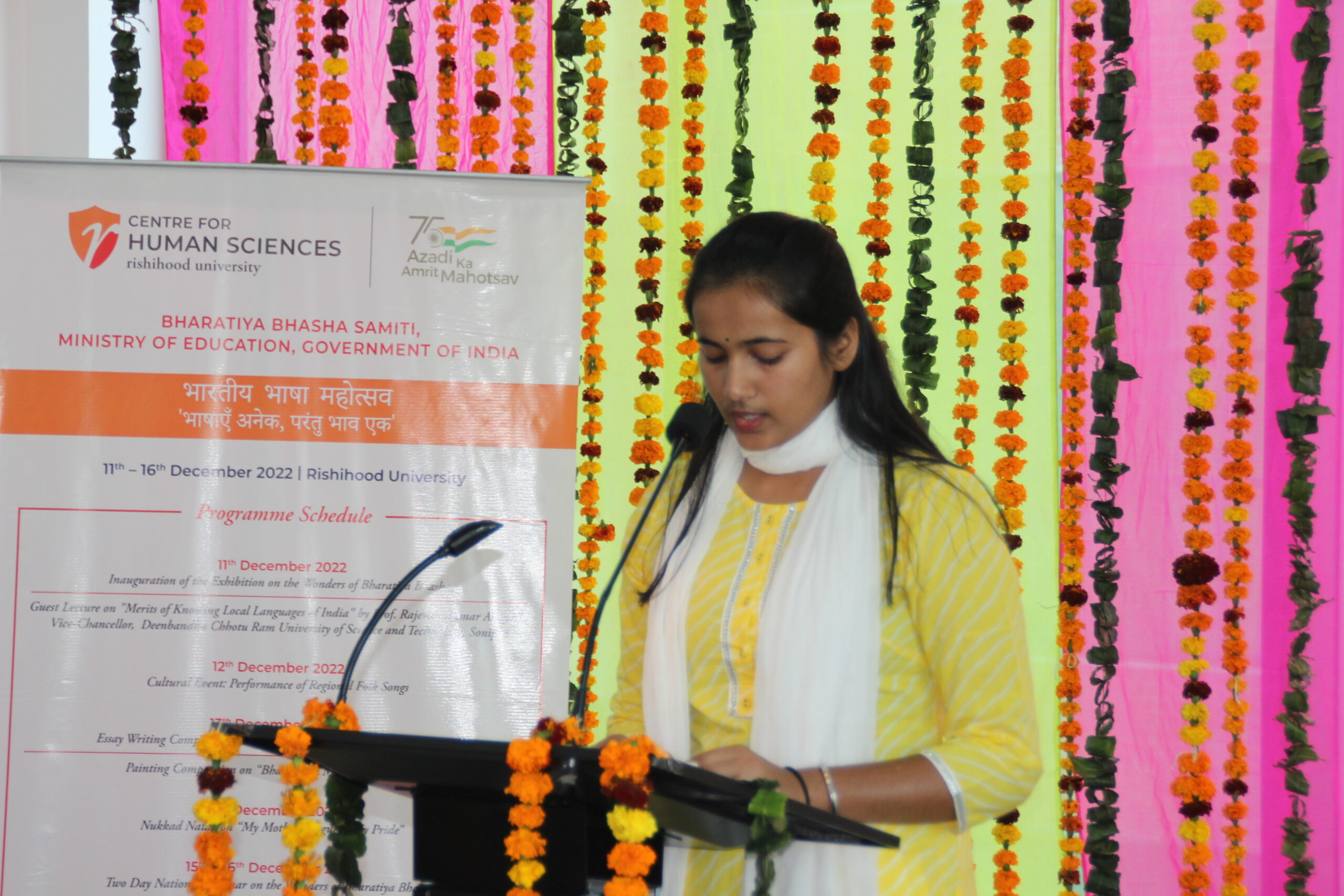
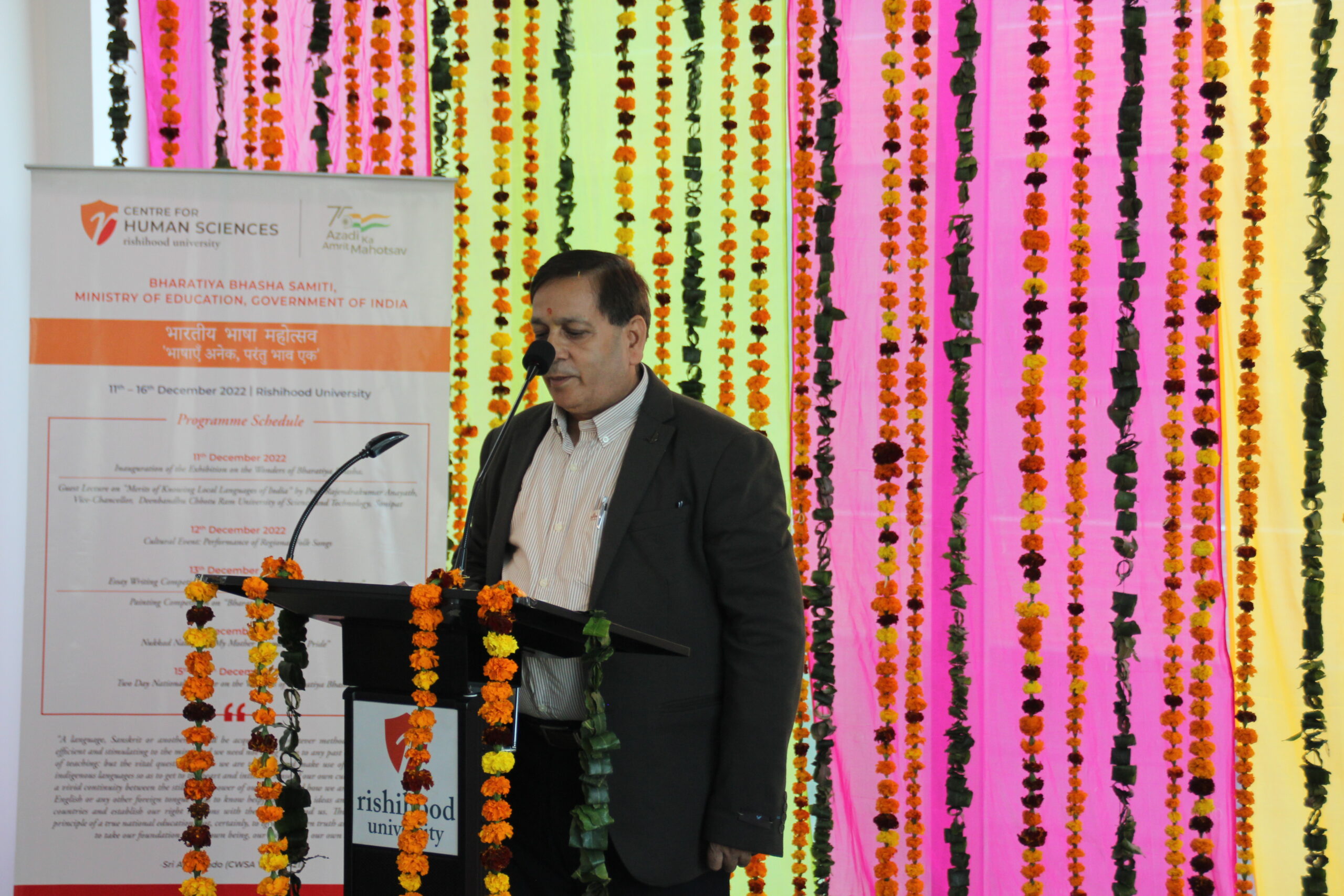
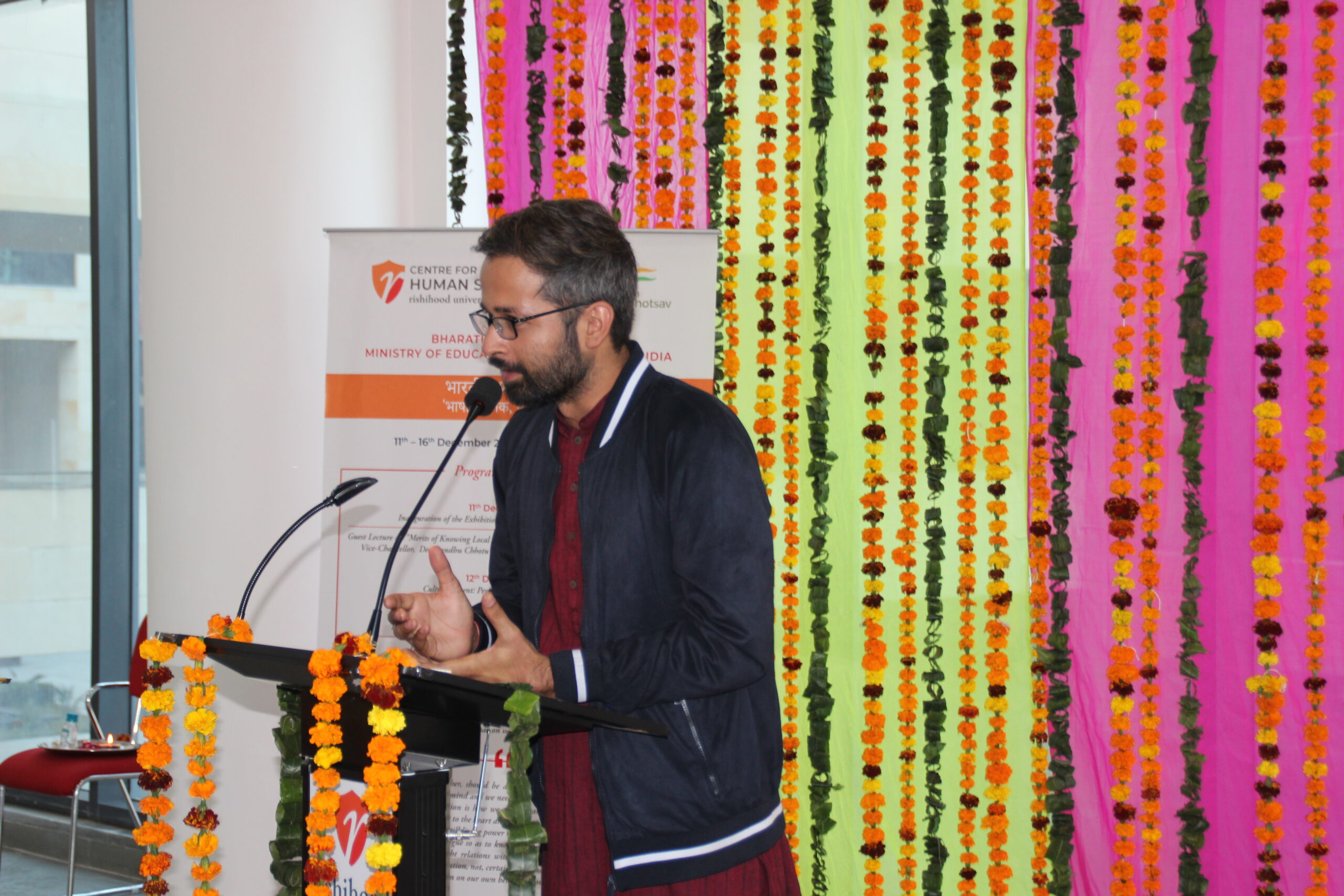
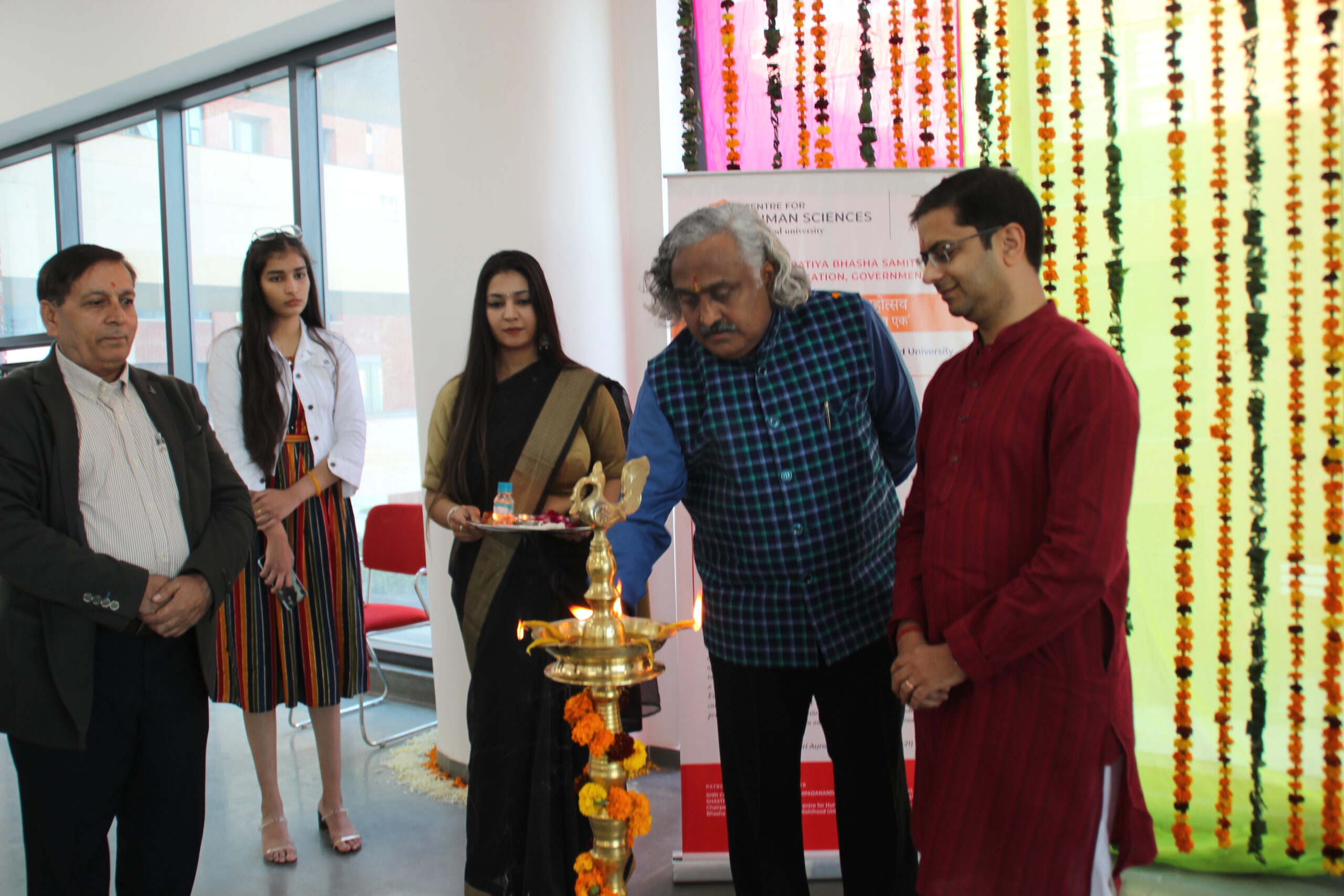
Samiti for celebrating Bharatiya Bhasha Diwas for giving opportunity to the young generation to showcase their talent in their mother tongue.
Shri Shobhit Mathur ji, in his address, explained the importance of learning and imparting education mother tongue by taking examples from his own life. He highlighted how it becomes very tough even for exceptionally talented and smart people to work in a language which is foreign to them. And therefore, it becomes extremely essential to educate our younger generation in our mother tongue, at least at our home, as they can easily learn English at school, but if we do not pass on our tongue to our children then the language will eventually become extinct, as we can see in the second generation of many families that migrated from India towards the west.
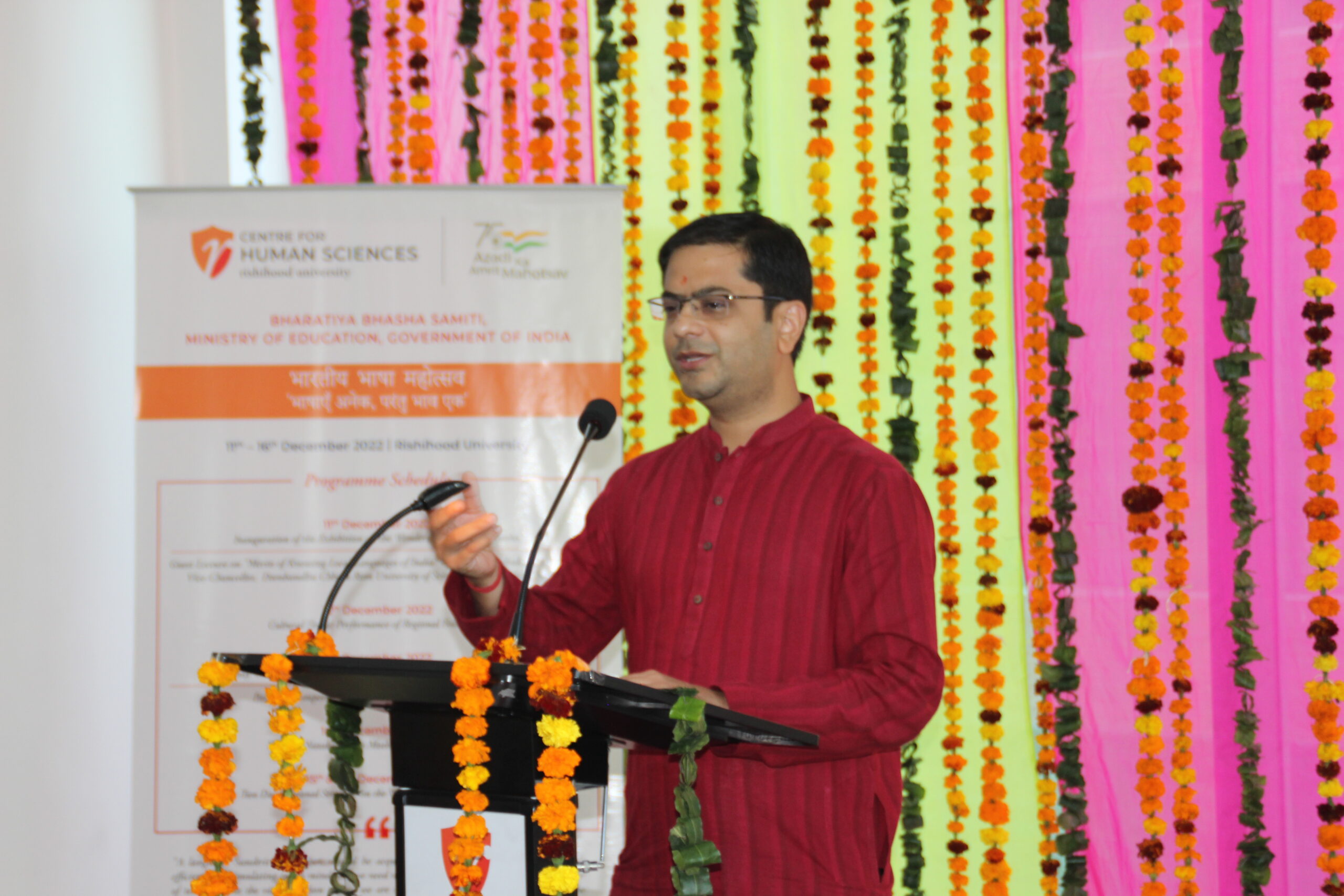
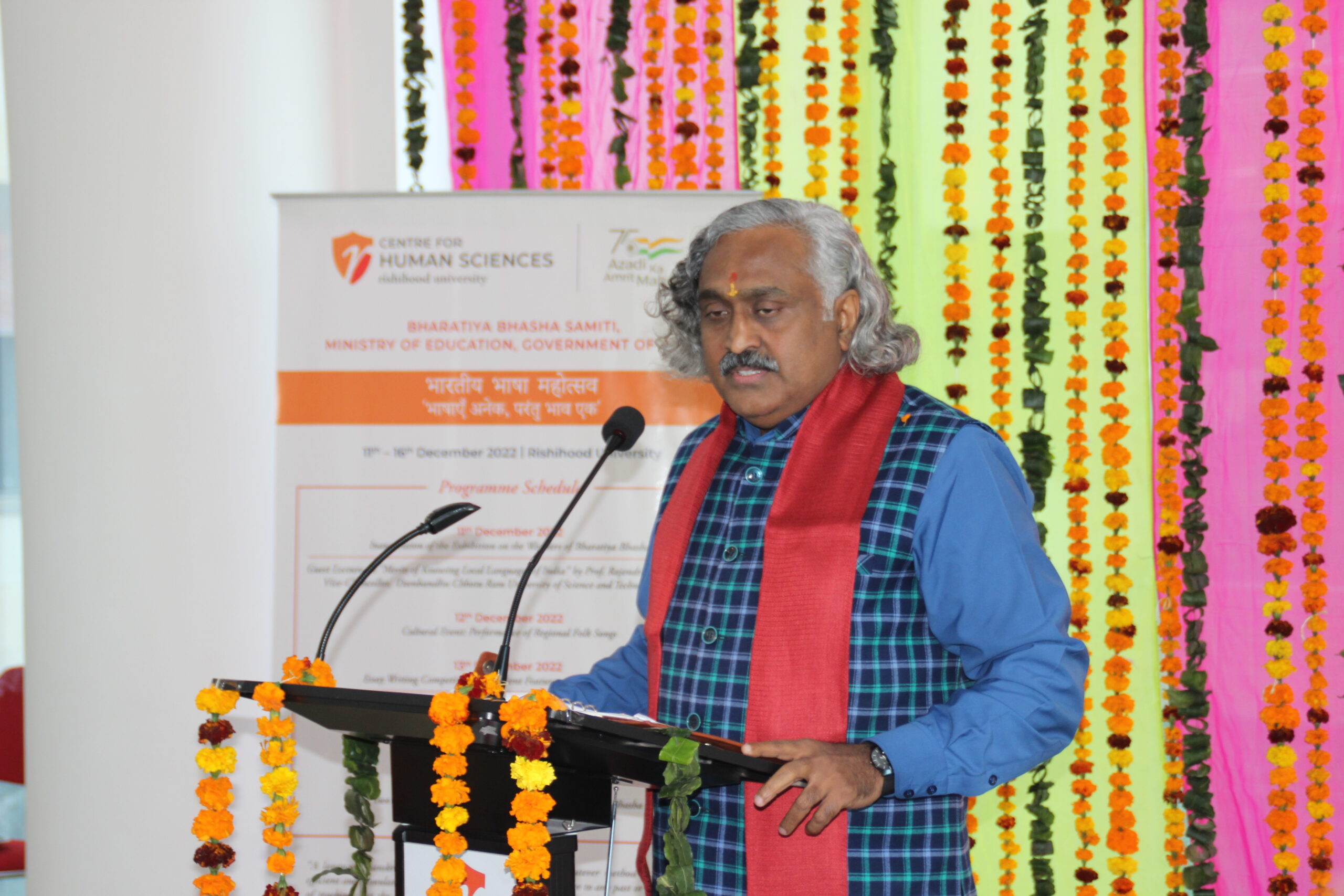
In the guest lecture on ‘The Merits of Knowing Local Indian Languages’, Prof. Rajendrakumar Anayath ji explained how mankind is characterised by the use of language for communication and how this ability helps mankind progress. He briefly explained the development of language from the ancient times and how communication evolved from cave paintings to oral tales and the use of rhetoric to the age of printing, where recording became convenient, to the present times characterised by the internet. He clarified that it was not Gutenberg who first invented the movable printing technique and the Bible was not the first book to be printed.
Clay printing technique was first invented by Bi Sheng, from China, about 700 years before Gutenberg and the first book to be printed was a Buddhist text by the name Vajracchedikā Prajñāpāramitā Sūtra or the Diamond Sutra. He also briefly explained the development of literature and how it progressed from being an educative tool to being a tool for propaganda in the 20th century through the example of George Orwell’s 1984. Talking about India, he elucidated how India has more than 19,500 dialects and 1069 languages as mother tongue, out of which 121 languages have more than 10,000 speakers. India also has 66 scripts, two official languages and 22 official languages. Out of these languages, Hindi is spoken by more than 52 crore people and 43.6 percent of the population considers Hindi as their first language.
Deliberating upon the purpose and benefits of knowing a language and reading novels, he explained how we have very little time when it comes to having an understanding of how others feel and it is only by reading novels that we get to experience others. He explained how we can never understand the true meaning of altruism without literature, as it gives us an opportunity to put ourselves in the shoes of others and understand their experience.
In the final part of his lecture, Prof. Anayath spoke about the nuances of bilingualism and multilingualism. He referred to Critical Period Theory according to which children learn languages more easily and learning a language in childhood gives a more holistic grasp of its social and emotional contest. He also pointed out that there is less emotional bias when a person learns and uses a second language. He also referred to research which shows how being multilingual helps us think in a better logical way and also prevents Alzheimer’s and dementia. He put stress on the point that there is no age for learning an extra language as it certainly gives us extra mileage in life. The lecture was followed by a brief question and answer session in which Prof. Anayath addressed the doubts of the participants.
Click the following link to watch the lecture:
An exhibition on the Wonders of Bharatiya Bhasha was set up in a beautifully decorated exhibition hall showcasing many interesting facts about the six classical languages of India, namely, Sanskrit, Odia, Tamil, Telugu, Malayalam, and Kannada. Apart from these, many daily use household objects like electronics, kitchen items, bathroom accessories, beauty products, ornaments, etc were on display with their Sanskrit names along with a blank sheet of paper on which the audience wrote the name of the objects in their local tongue. The exhibition also displayed several posters depicting the Sanskrit terminology of human body parts, birds, animals, plants, ancient Indian games, puzzles and riddles, among others.
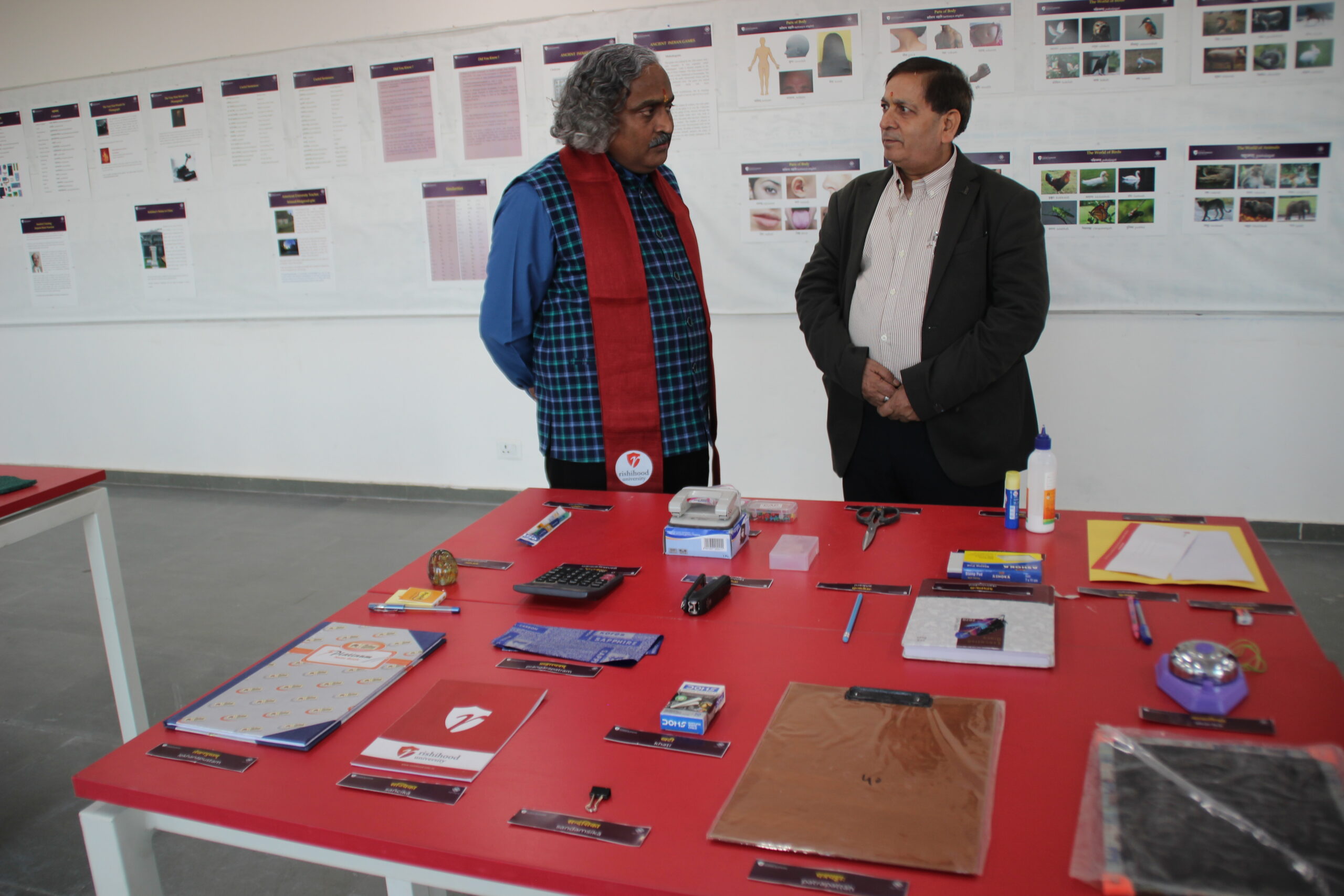
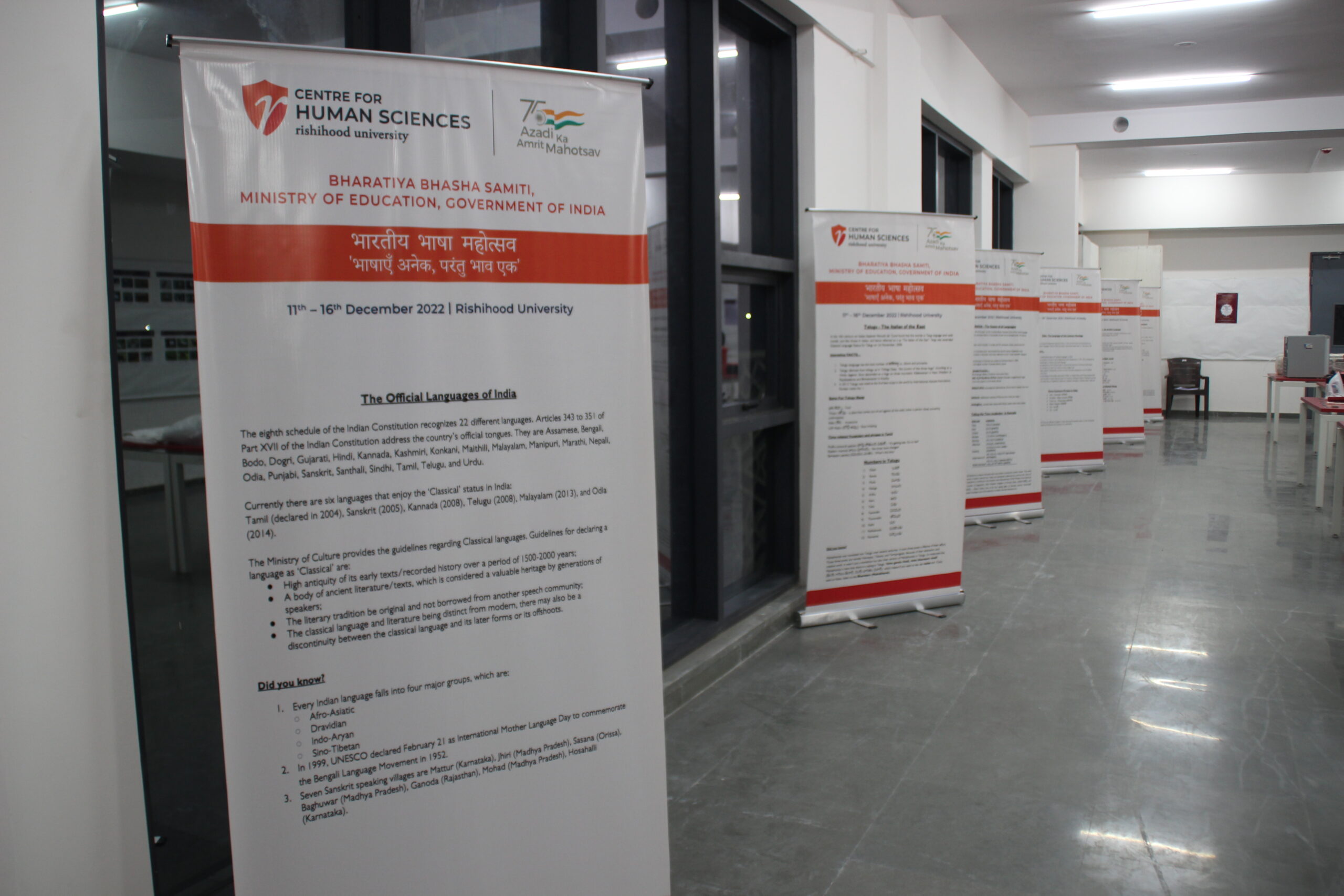
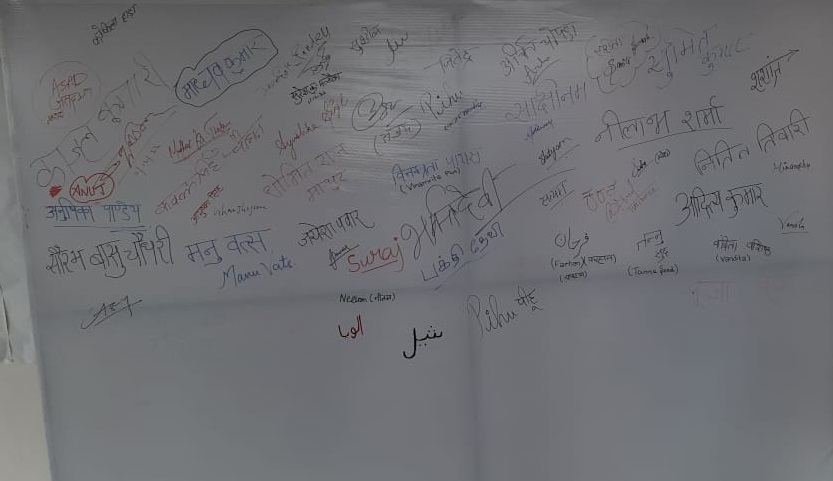
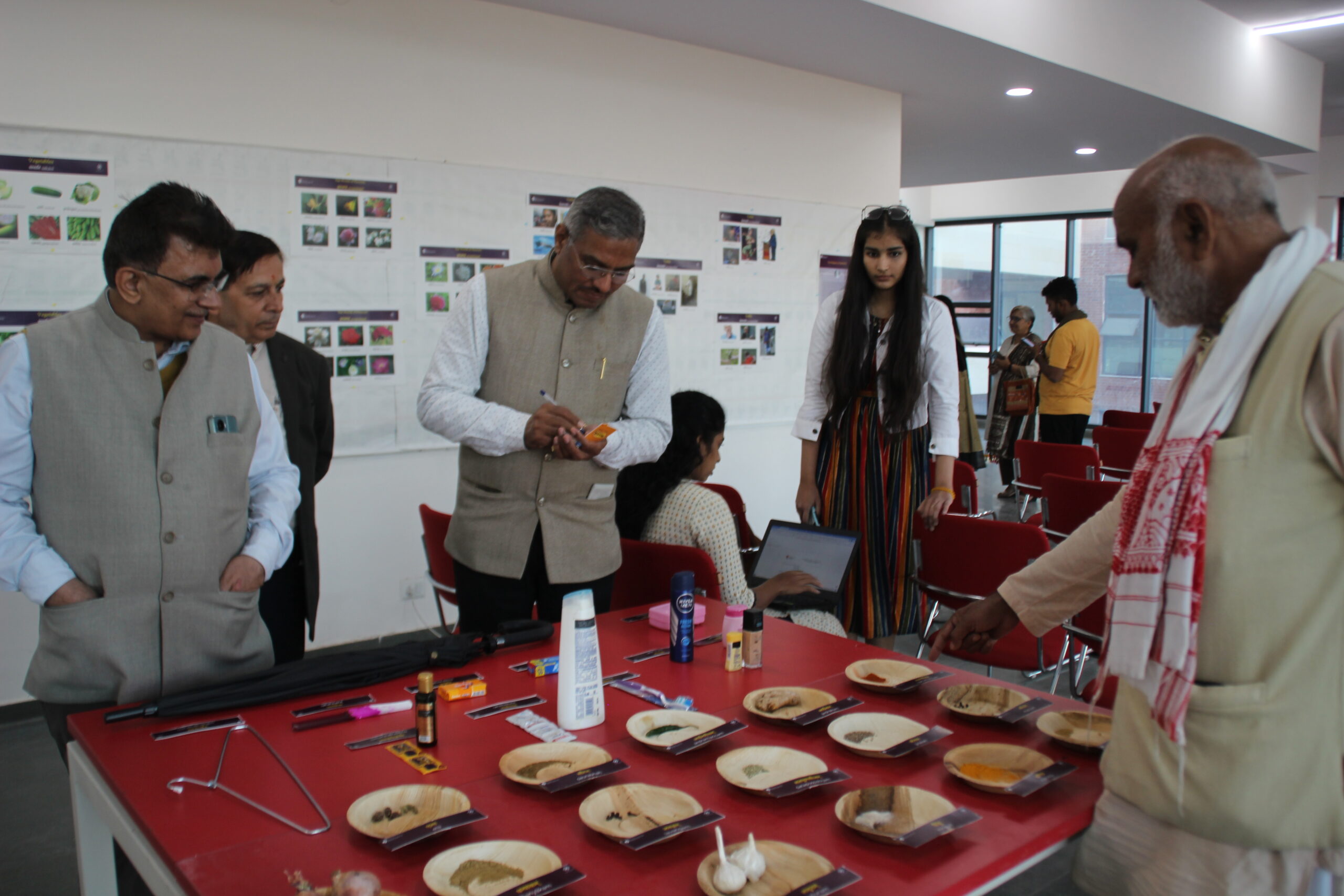
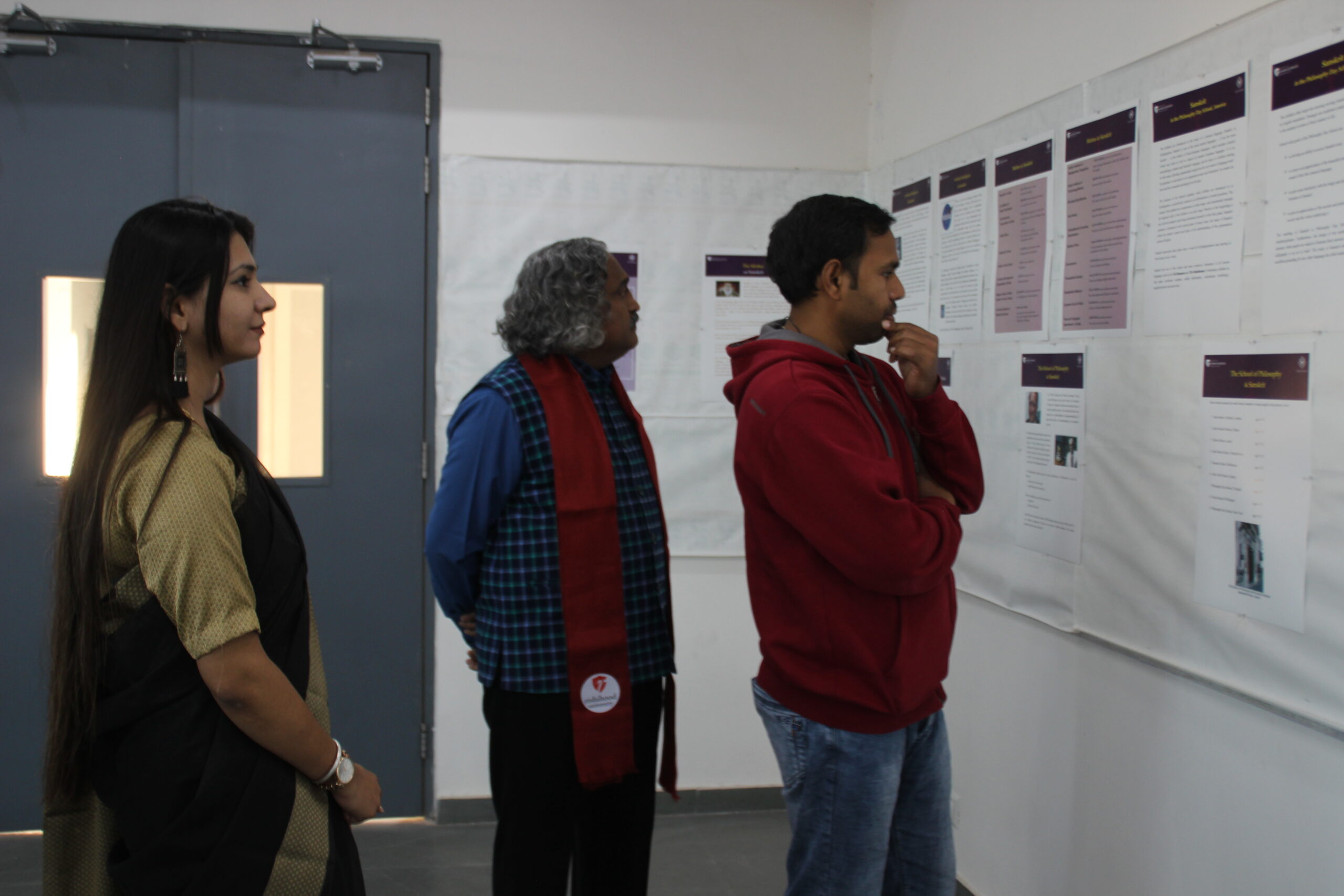
A signature campaign on the theme “Meri Bhasha Meri Pehchaan” was also organised, in which the participants wrote their names in their mother tongue.
The vote of thanks was delivered by Neelabh Sharma, coordinator of the six-day event. The day ended with Dharana, by observing a minute of silence.
Day 2 (12th December 2022)
On the second day, a singing and dancing competition was organised in the mini auditorium of Rishihood University. The participating students presented singing and dancing performances in their mother tongue. The singing competition had participants performing Hindi, Gharwali, Marathi, Manipuri and Gujarati songs and the folk dance performances included Bharatnatyam, Manipuri as well as popular Hindi songs.
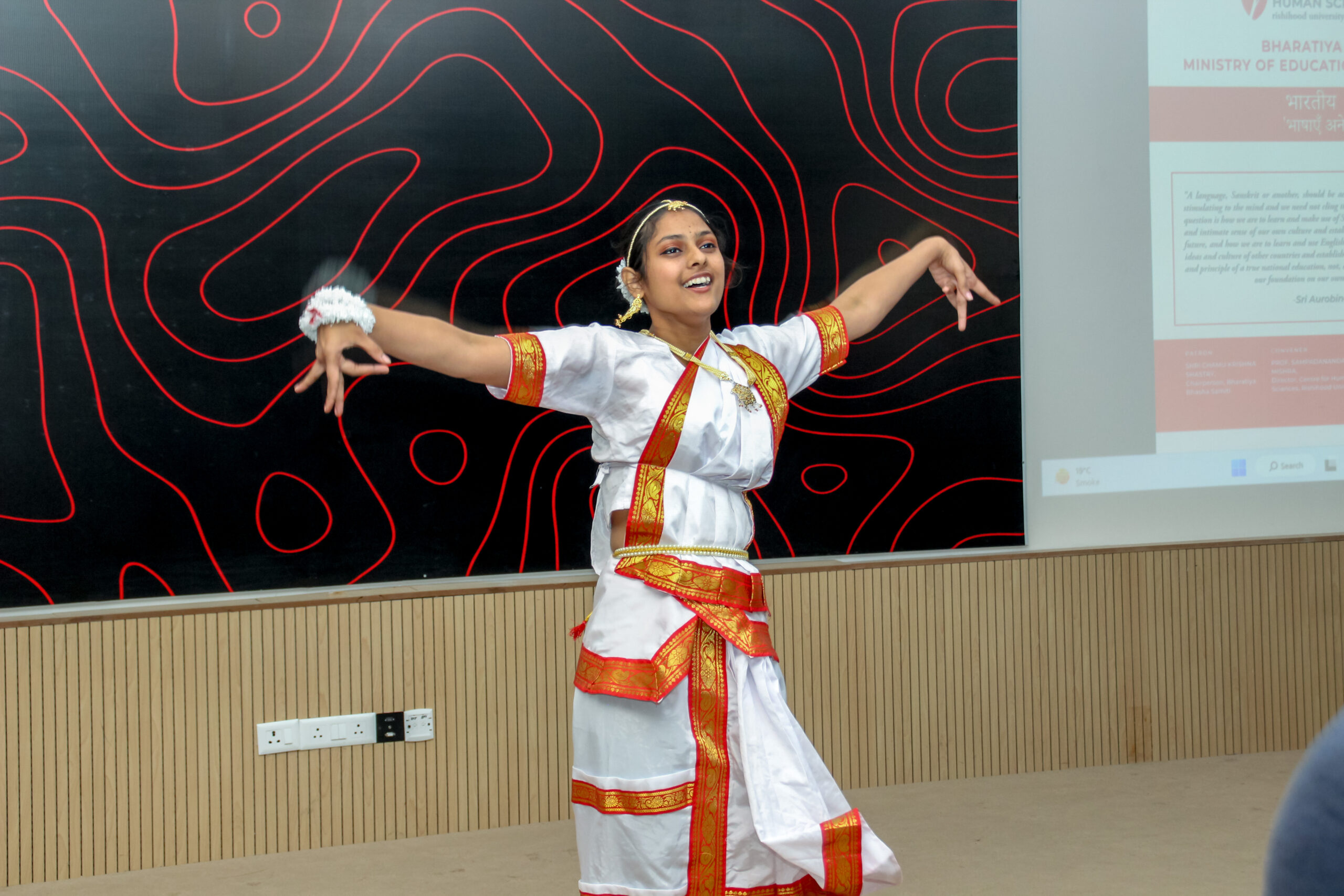
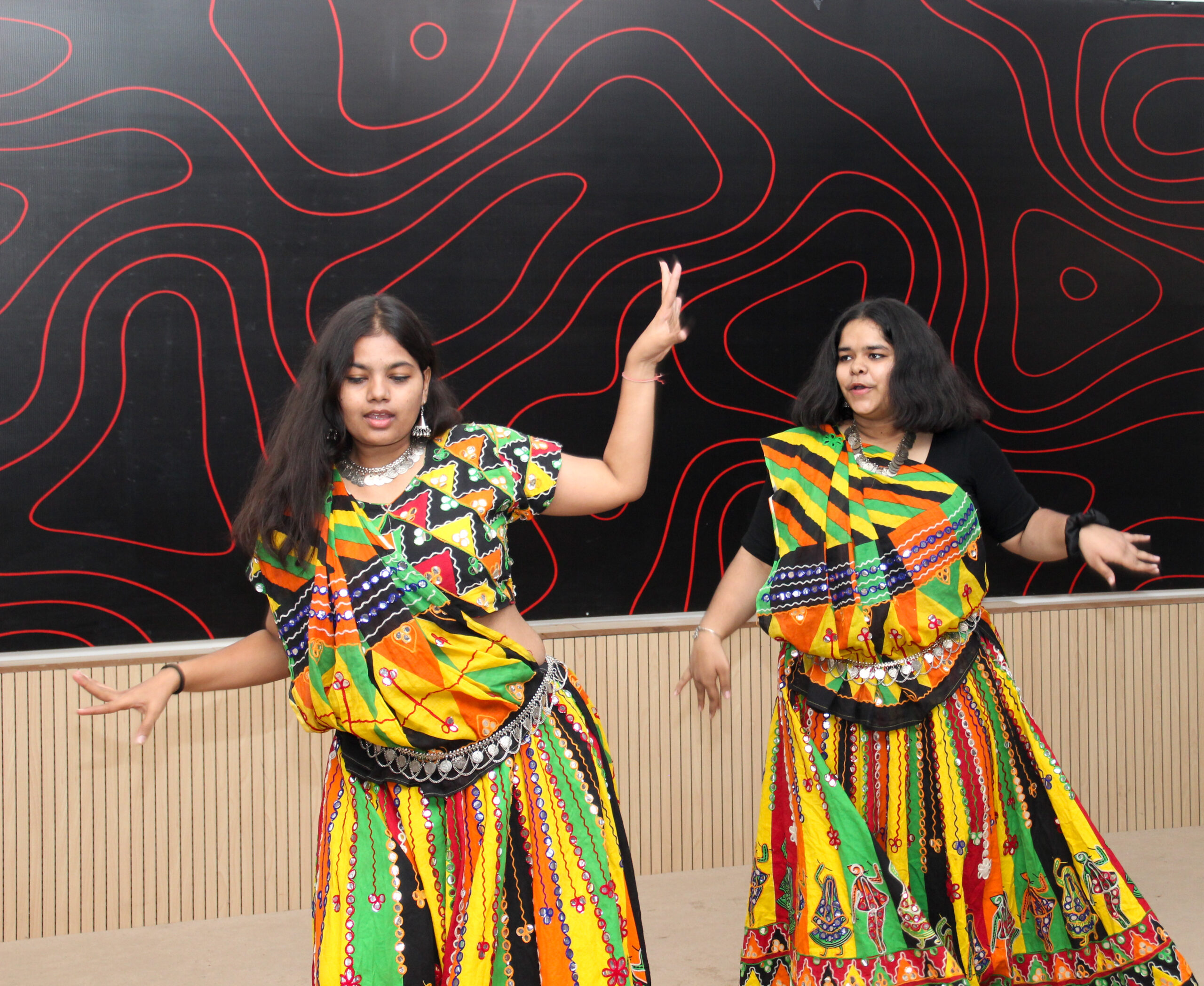

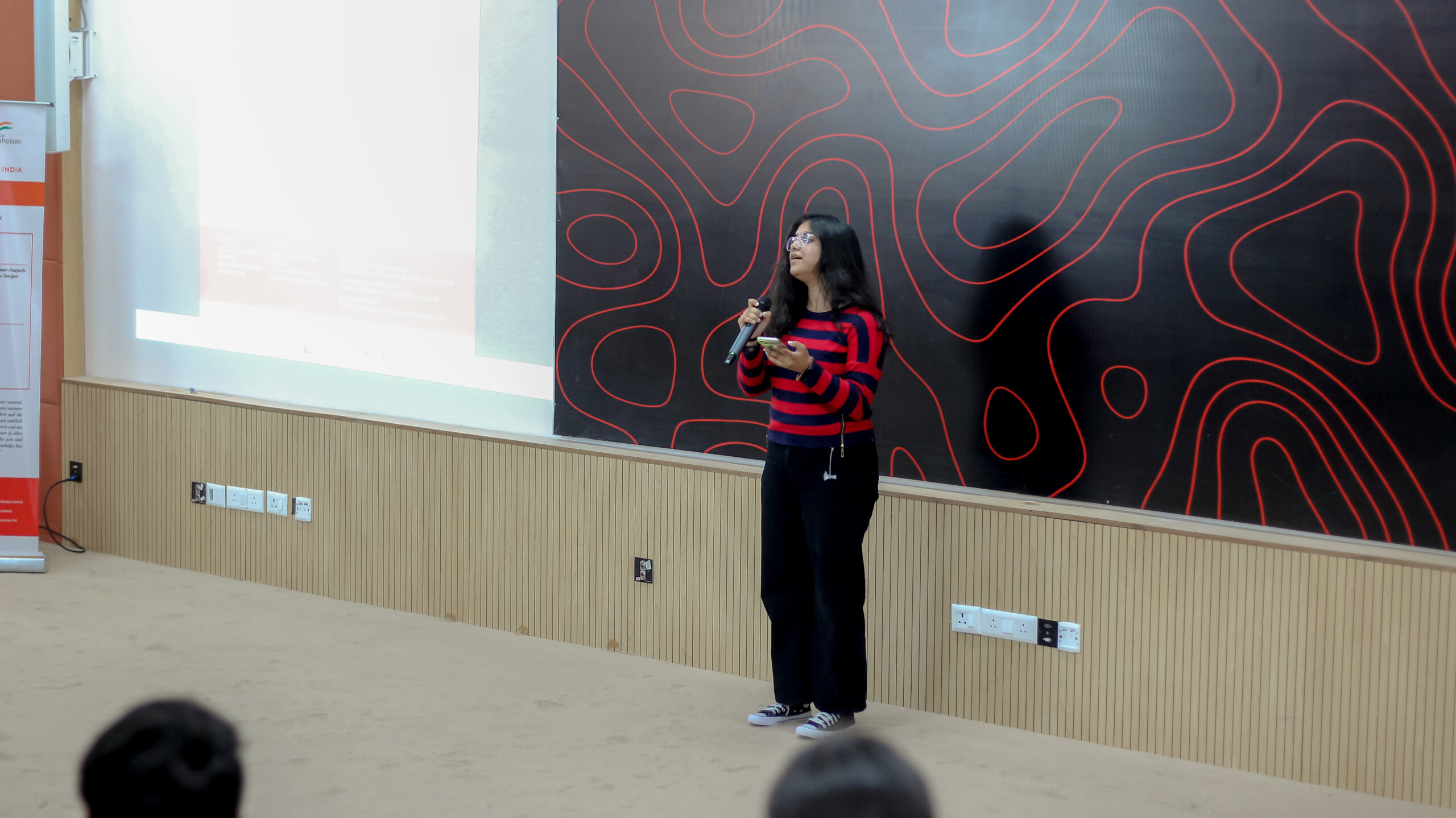
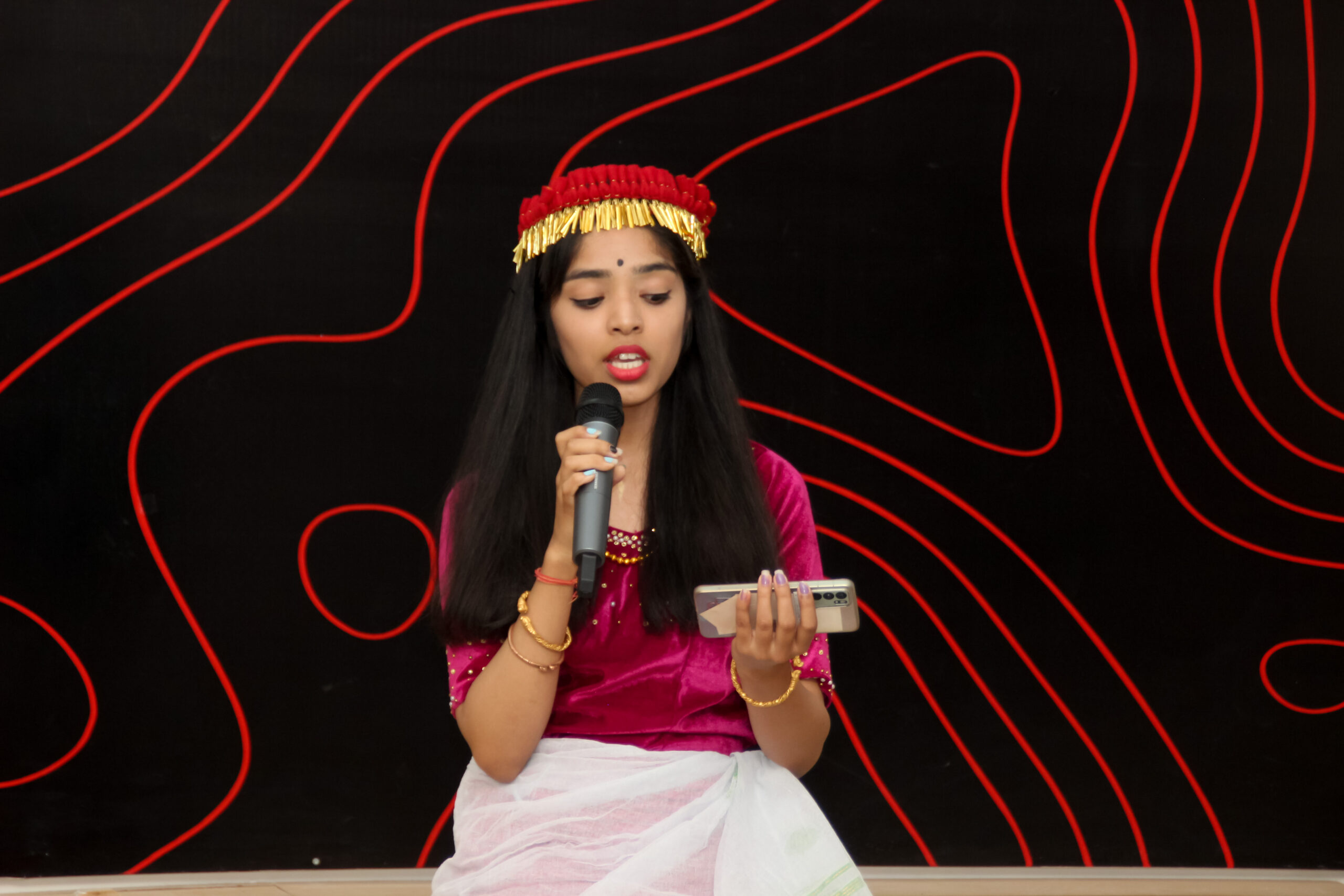
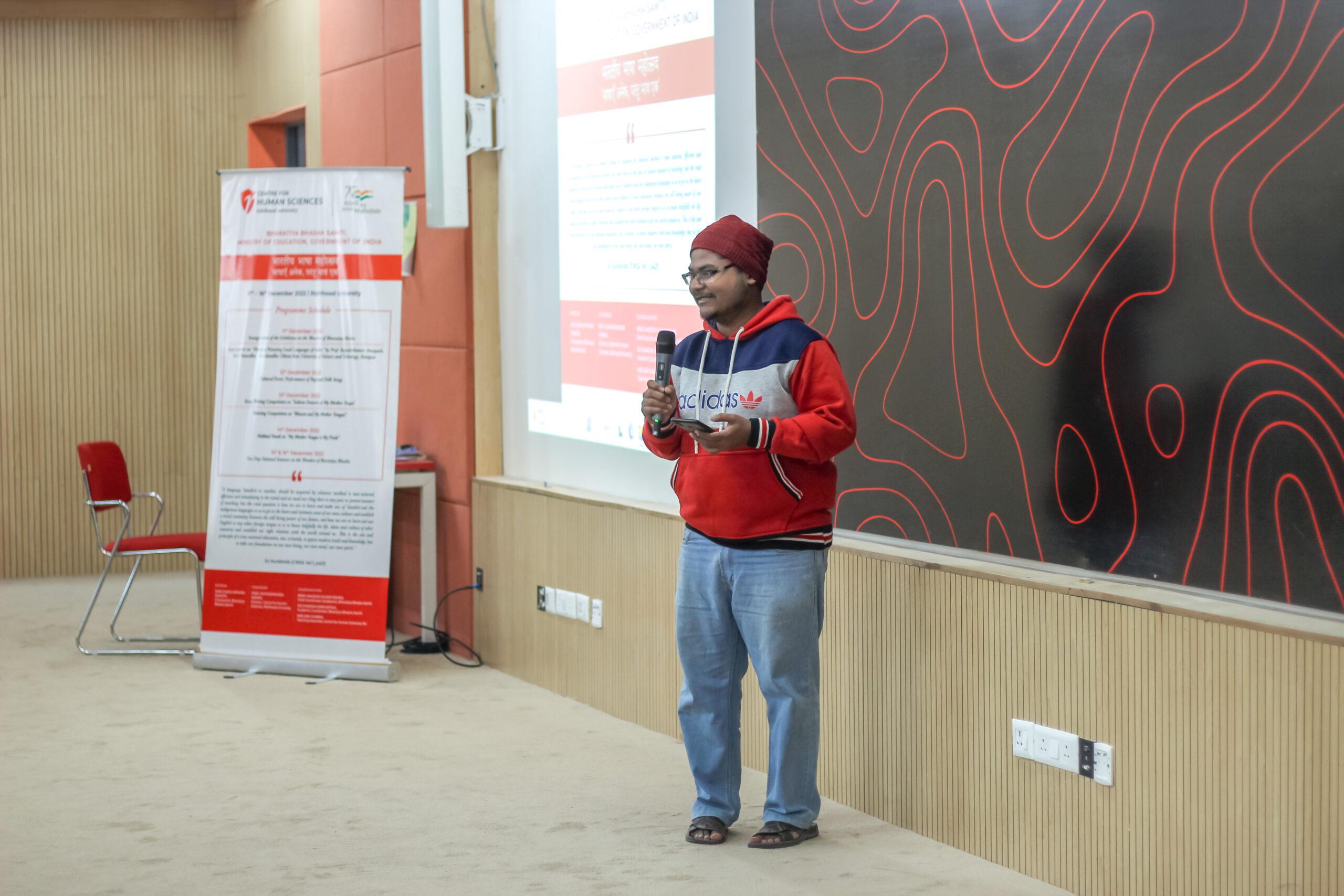
Day 3 (13th December 2022)
Painting and essay writing competitions were conducted on the third day. The students showcased their talent by creating beautiful drawings and paintings based on the theme of “My language. My Identity”. The students also wrote wonderful and informative essays on the theme of “Salient Features of My Mother Tongue” in Indian languages like Hindi, Tamil, Kannada, and so on.
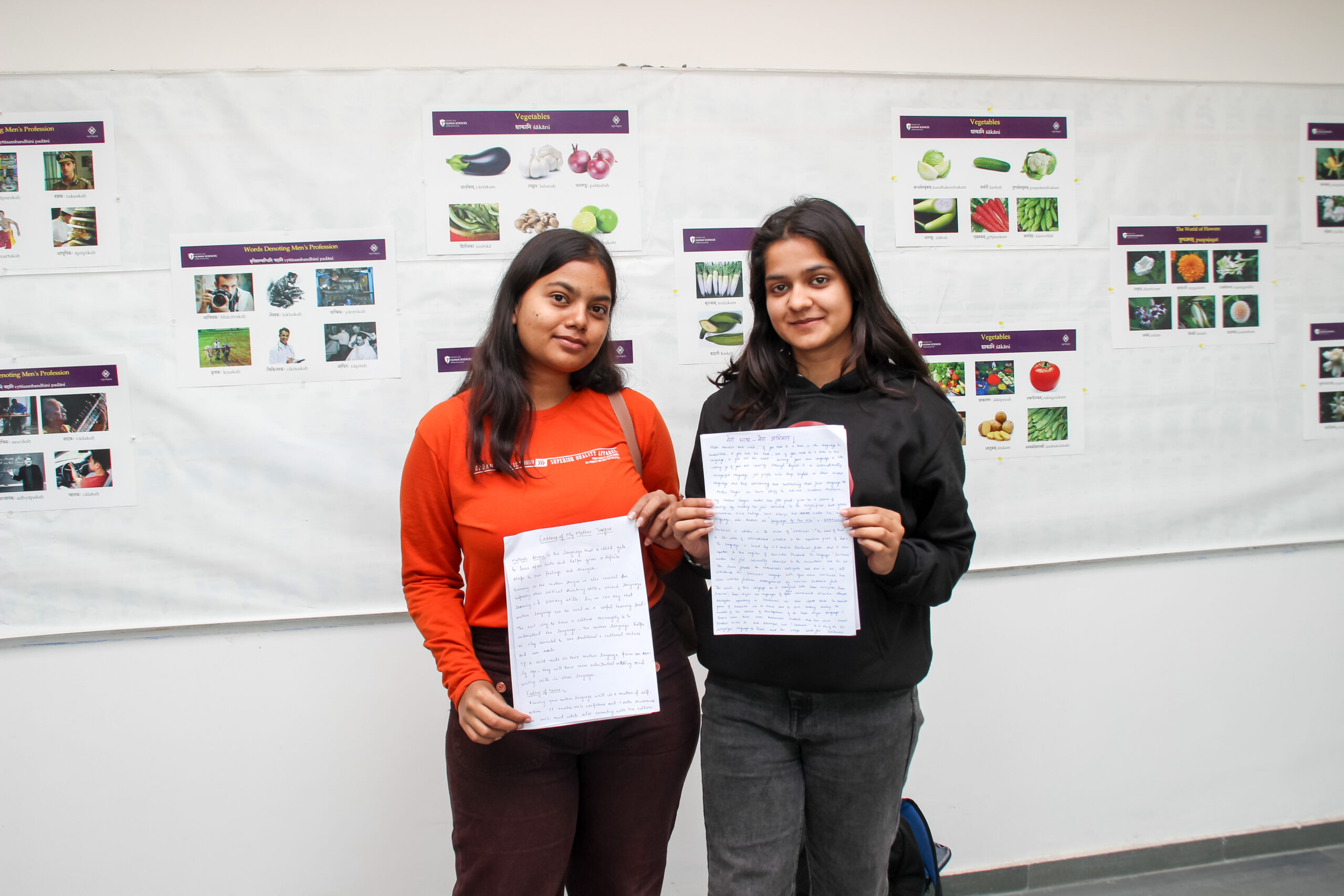
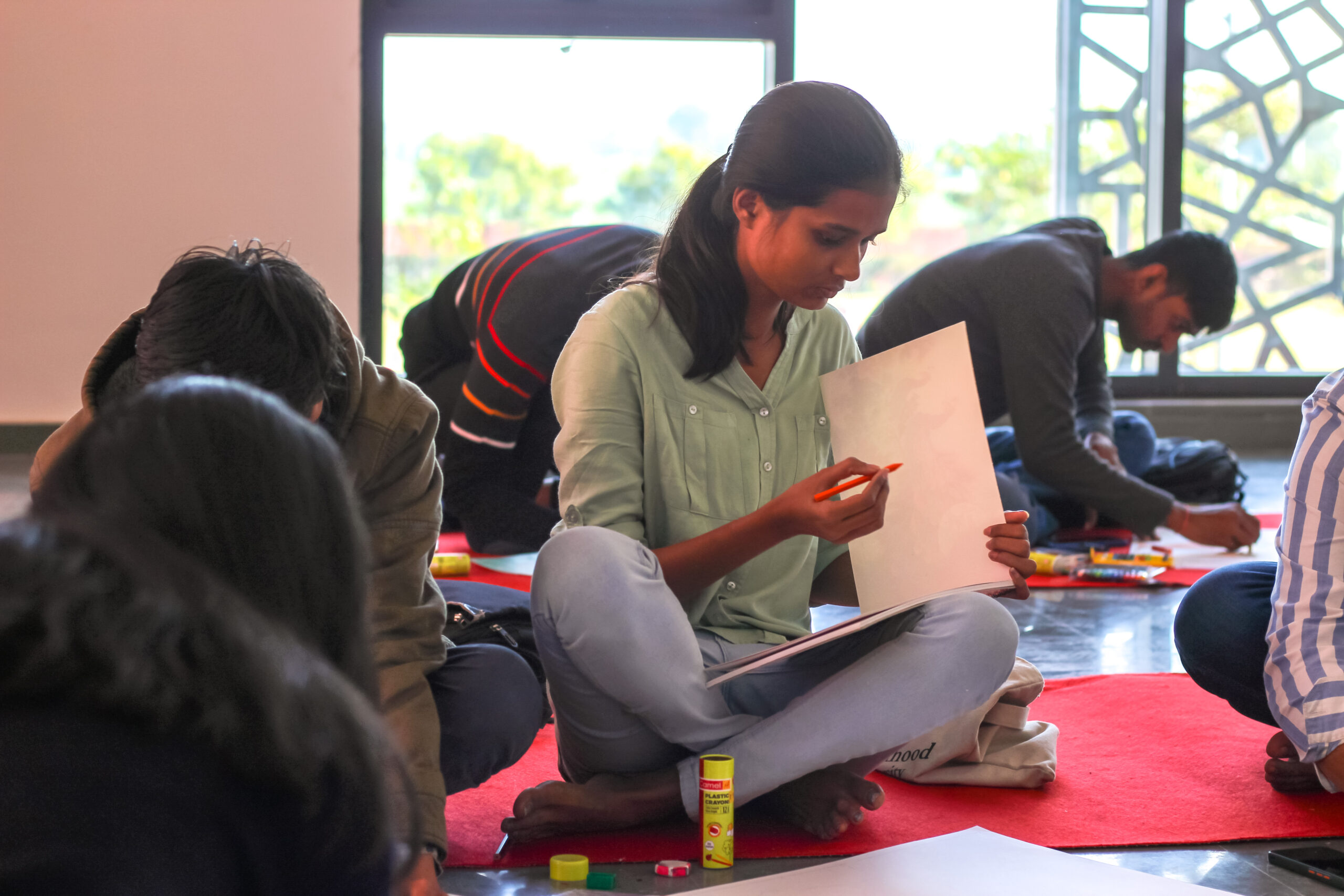
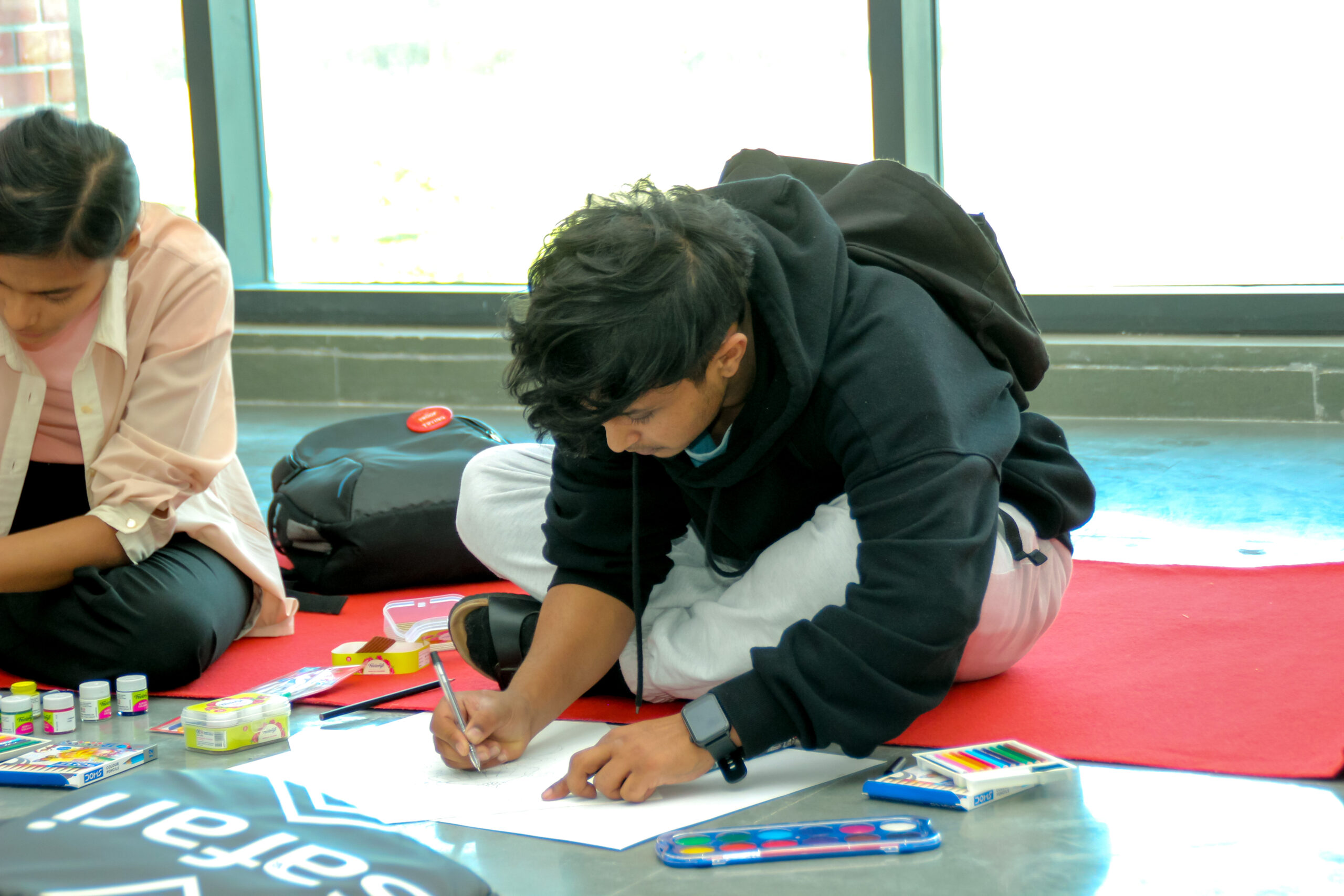
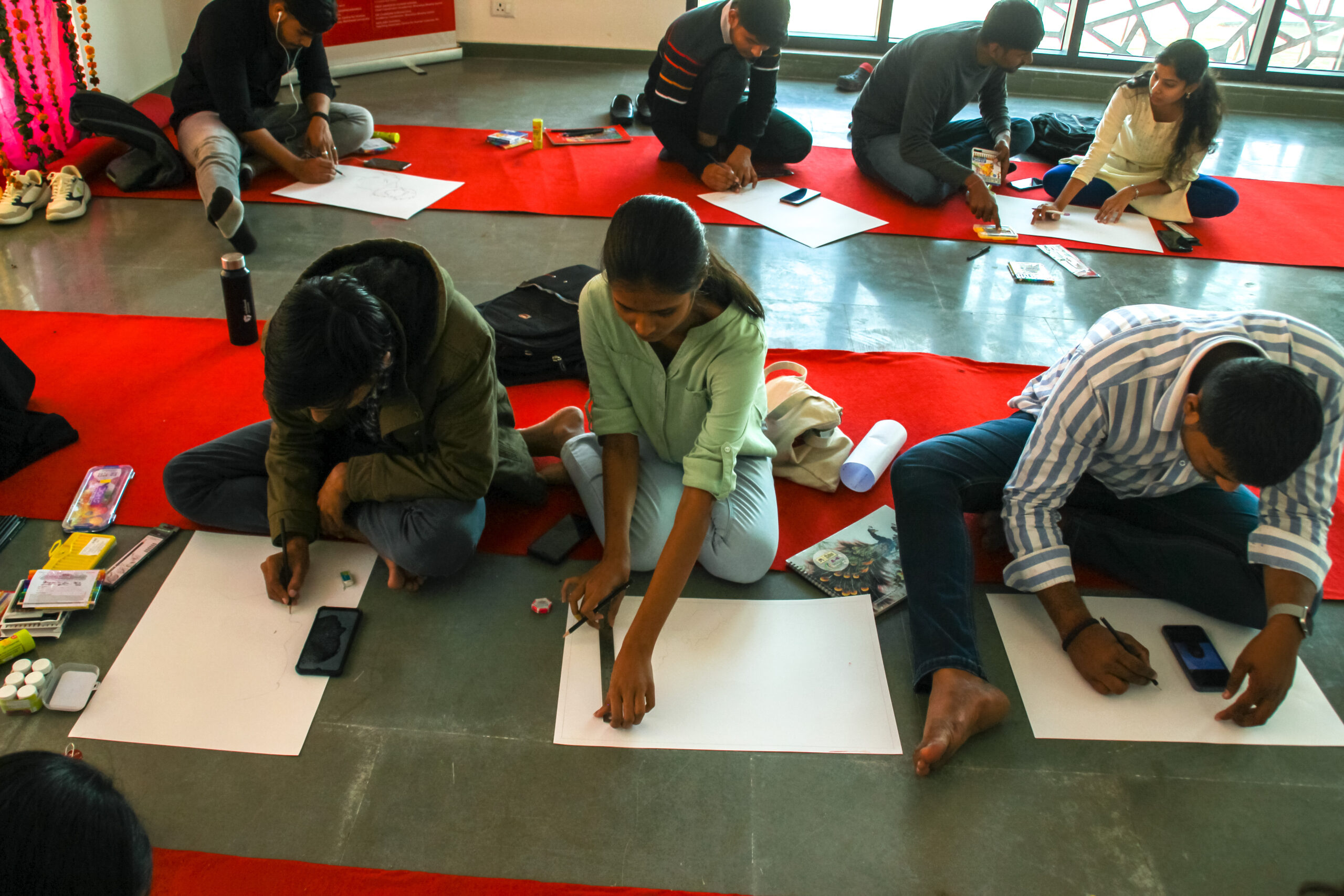
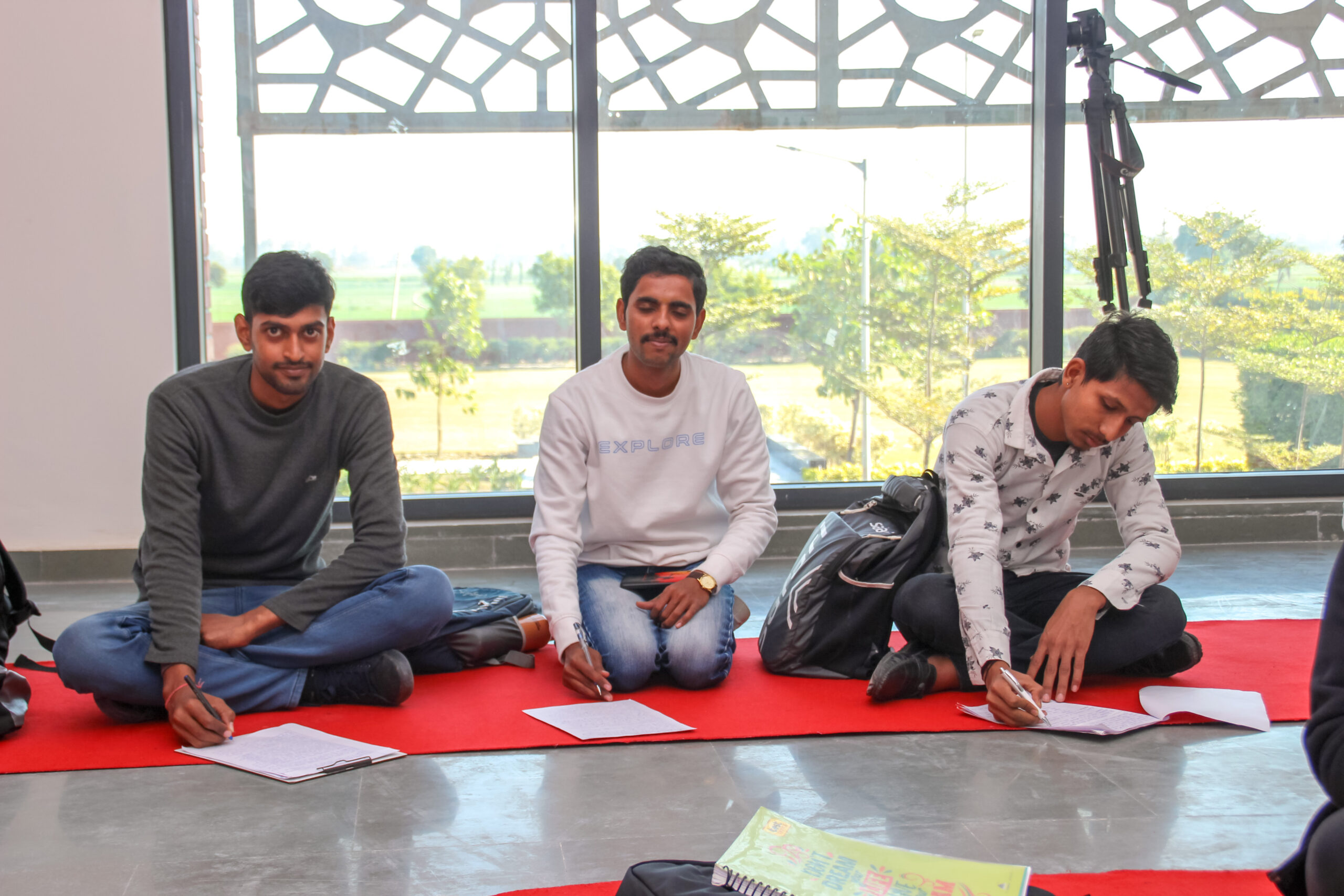
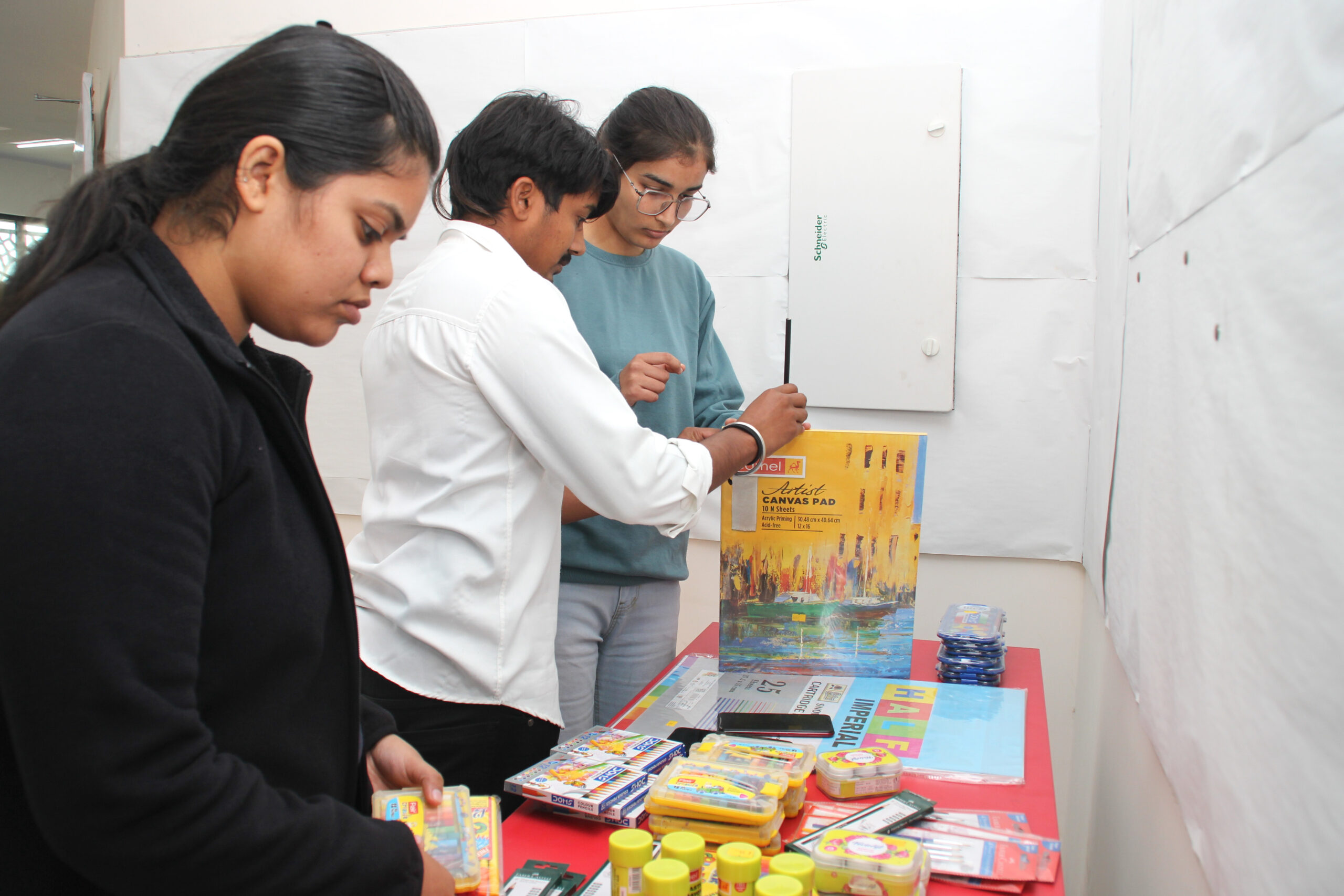
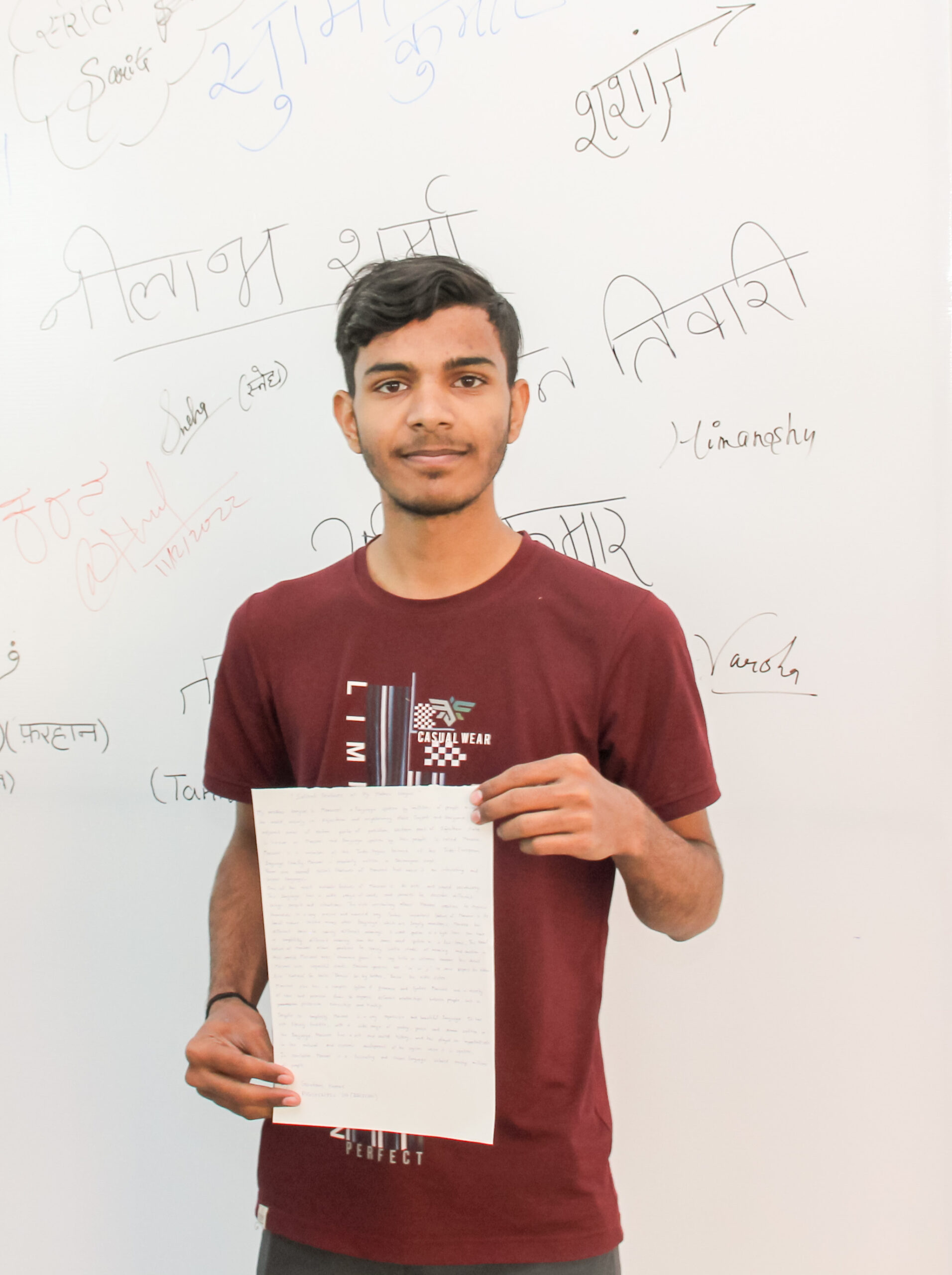

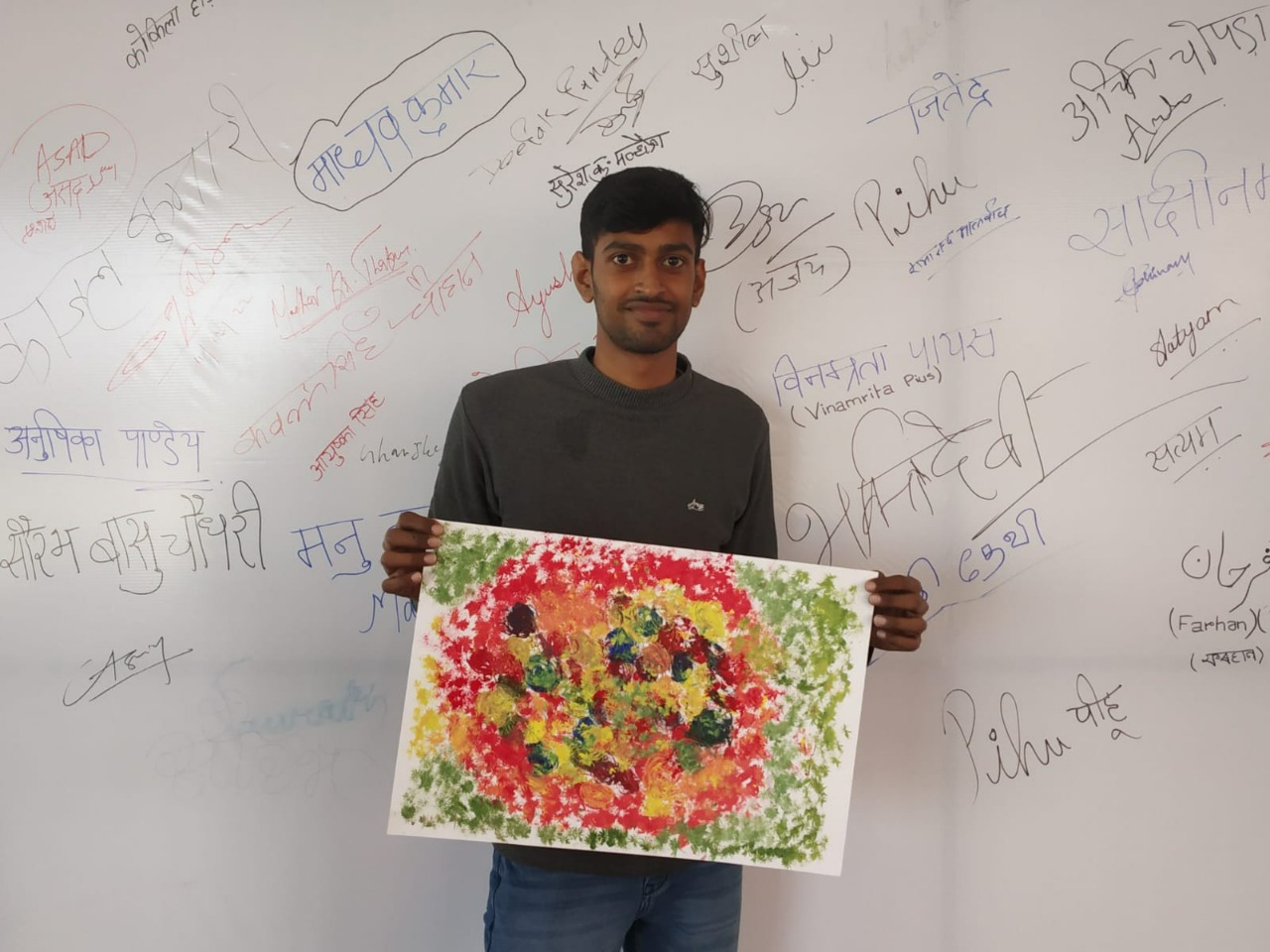
Day 4 (14th December 2022)
Nukkad natak and drama competition was organised on the fourth day of the event. The students from various departments participated and gave performances
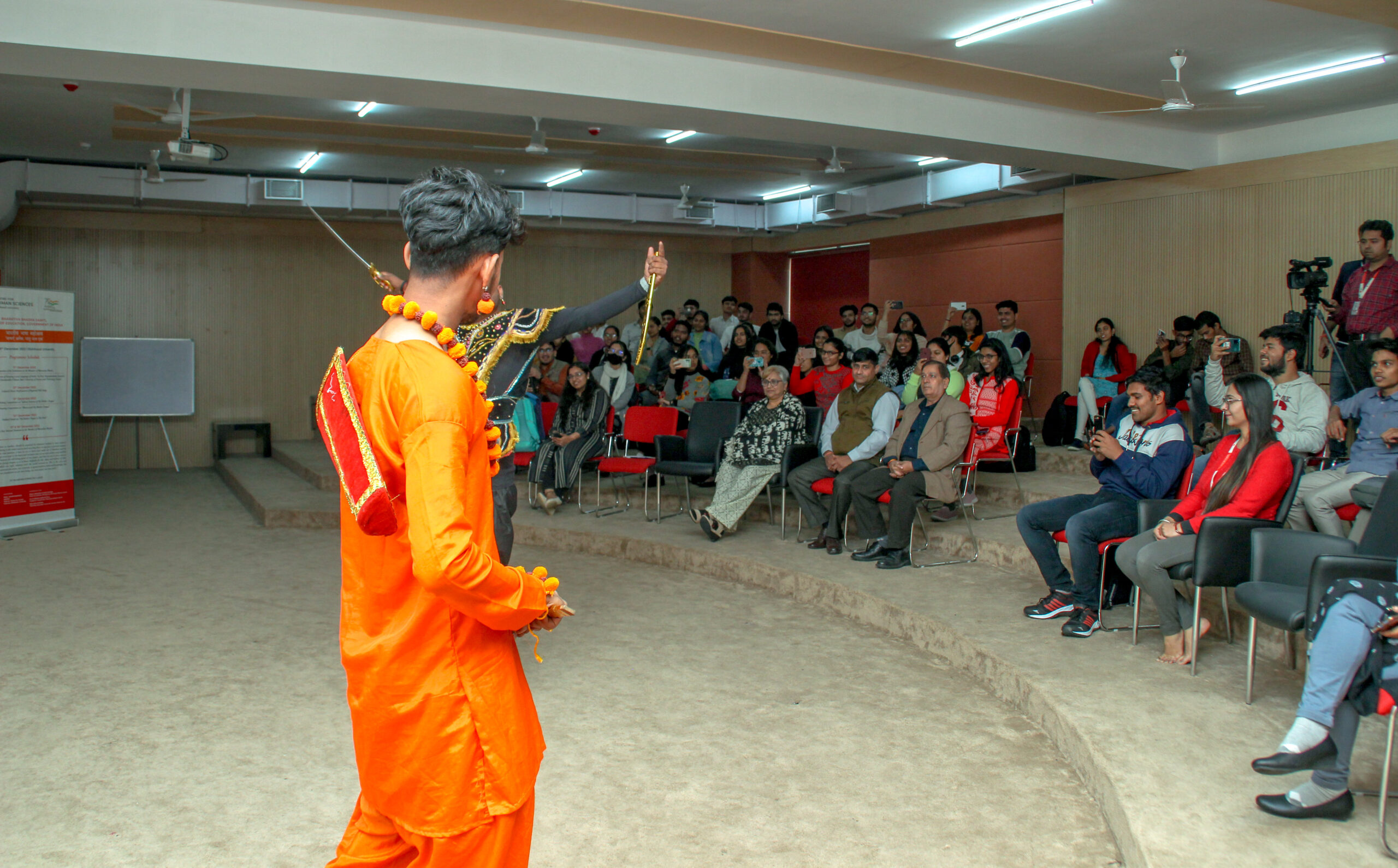
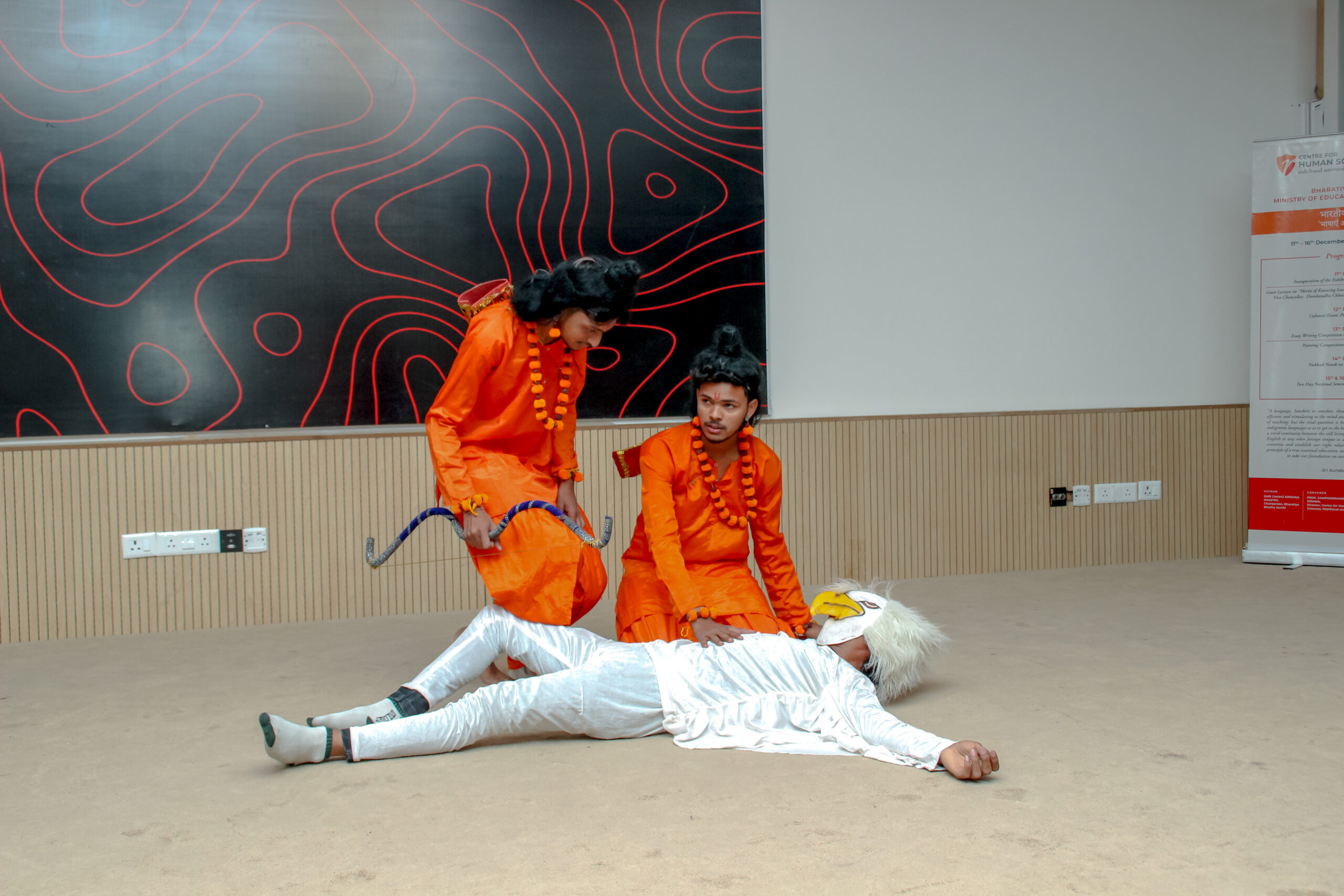
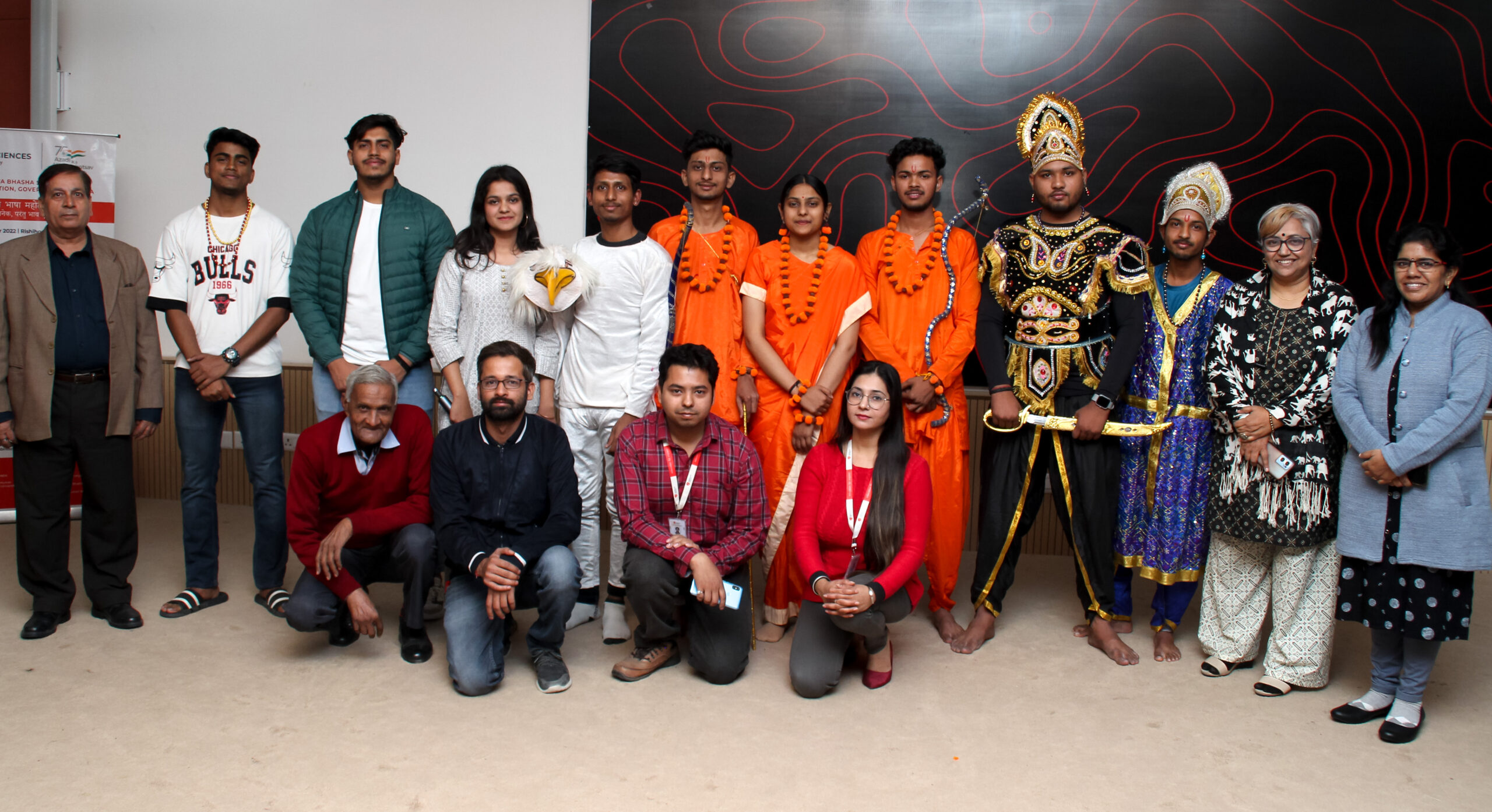
in various Indian languages. The spectacular Ramleela performed by the students was the main point of attraction for the audience.
Day 5 (15th December 2022)
Click on the link below to watch the entire session:
A two day national seminar on ‘The Wonders of Bharatiya Bhasha’ was organised at Rishihood University in which eight renowned scholars from various parts of India presented their talk centred around the salient features of each classical language of India. Prof. Radha Vallabh Tripathi ji, ex-vice chancellor, Rashtriya Sanskrit Sansthan, graced the occasion as the chief guest and Prof. Balram Singh, Professor and President at Institute of Advanced Sciences, Dartmouth, delivered the special address.
The two-day national seminar started with Ekagrata, by observing a minute of silence, which was followed by a beautiful invocation of the divine by Sakshi Chauhan, learner at Rishihood University. After this, all the esteemed guests came forward for the deep prajjwalan and formally inaugurated the seminar with the invocation to Agni. After this, Prof. Shobhit Mathur ji and Shri Sahil Agarwal ji felicitated the guests by presenting them with tokens of honour.
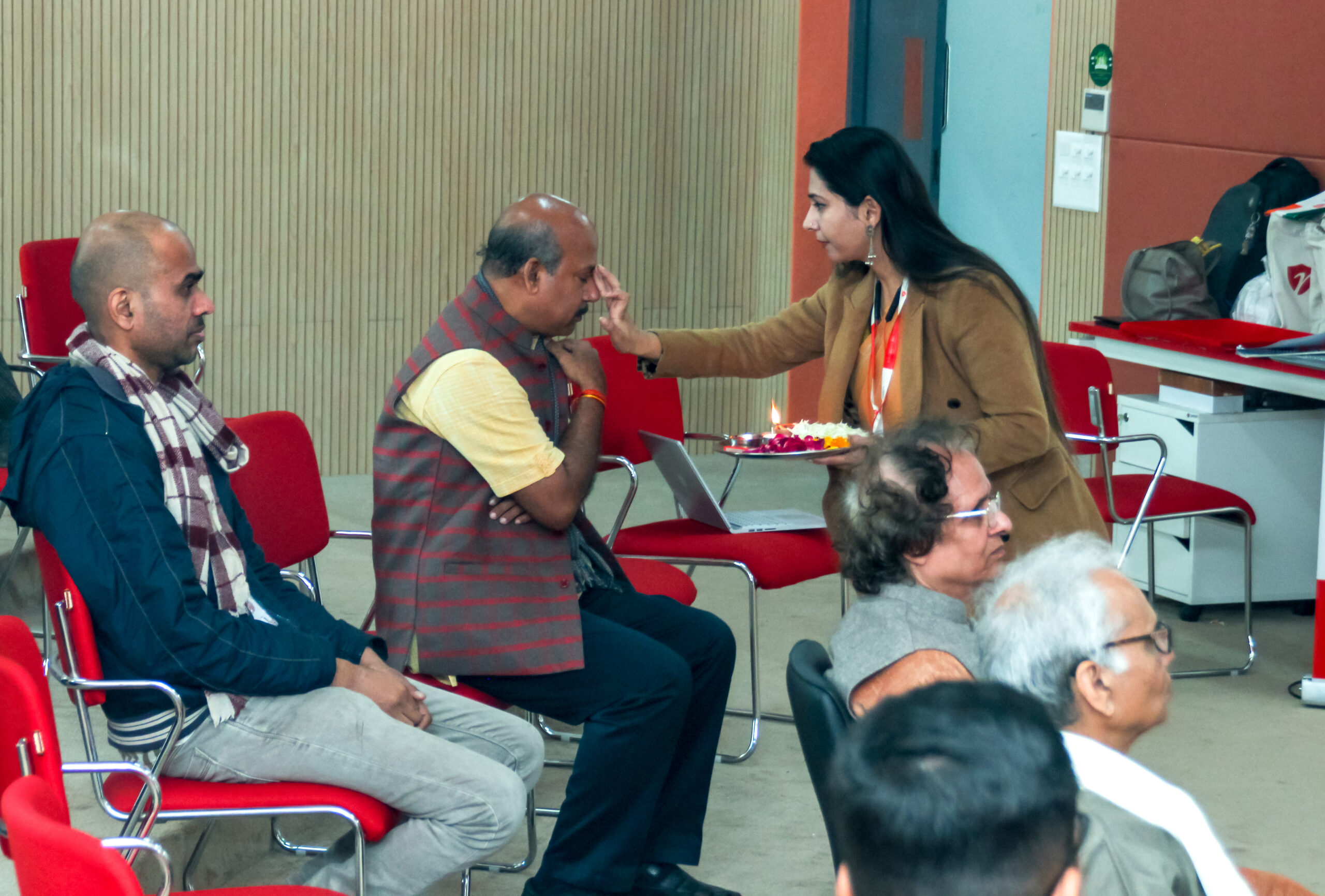
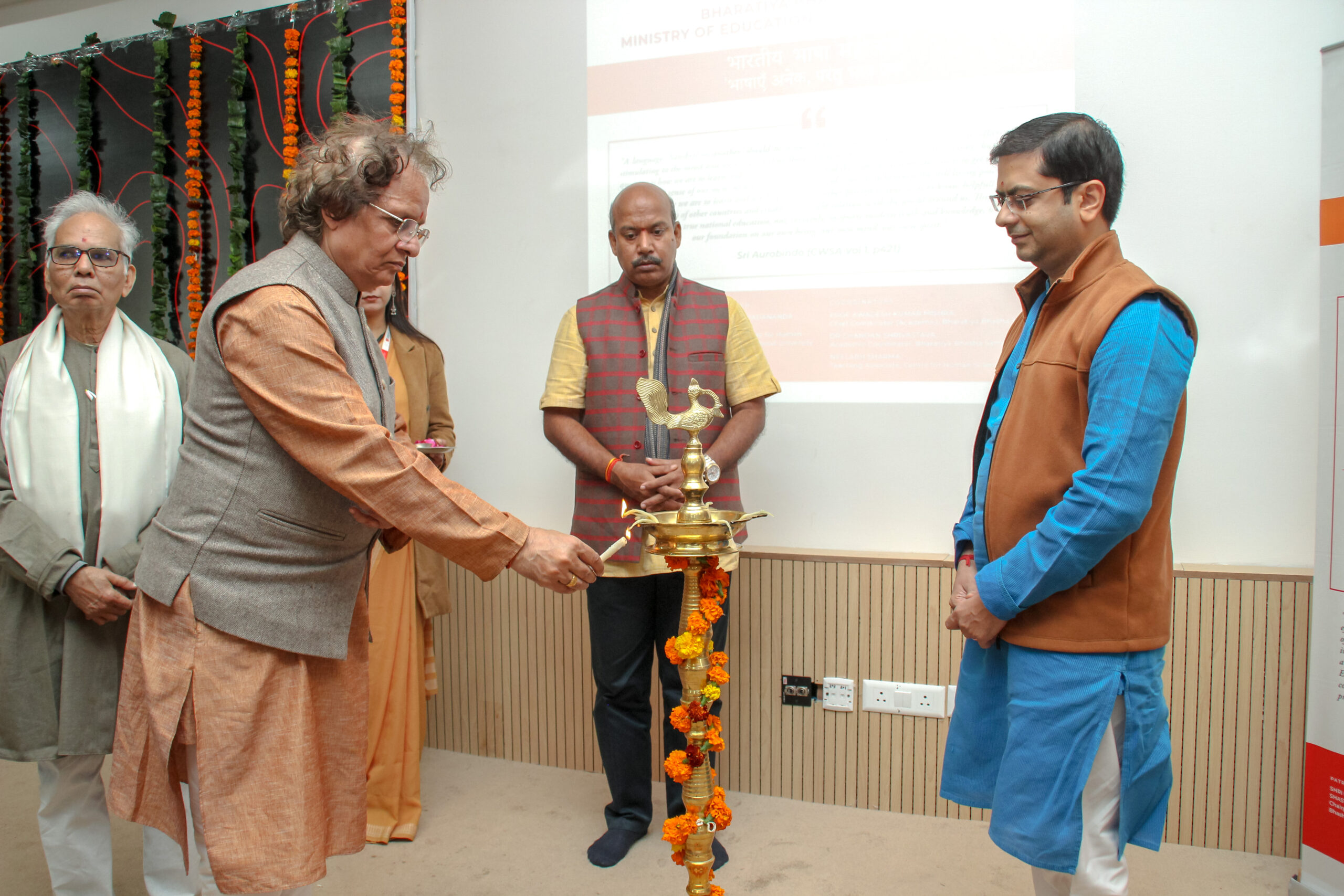
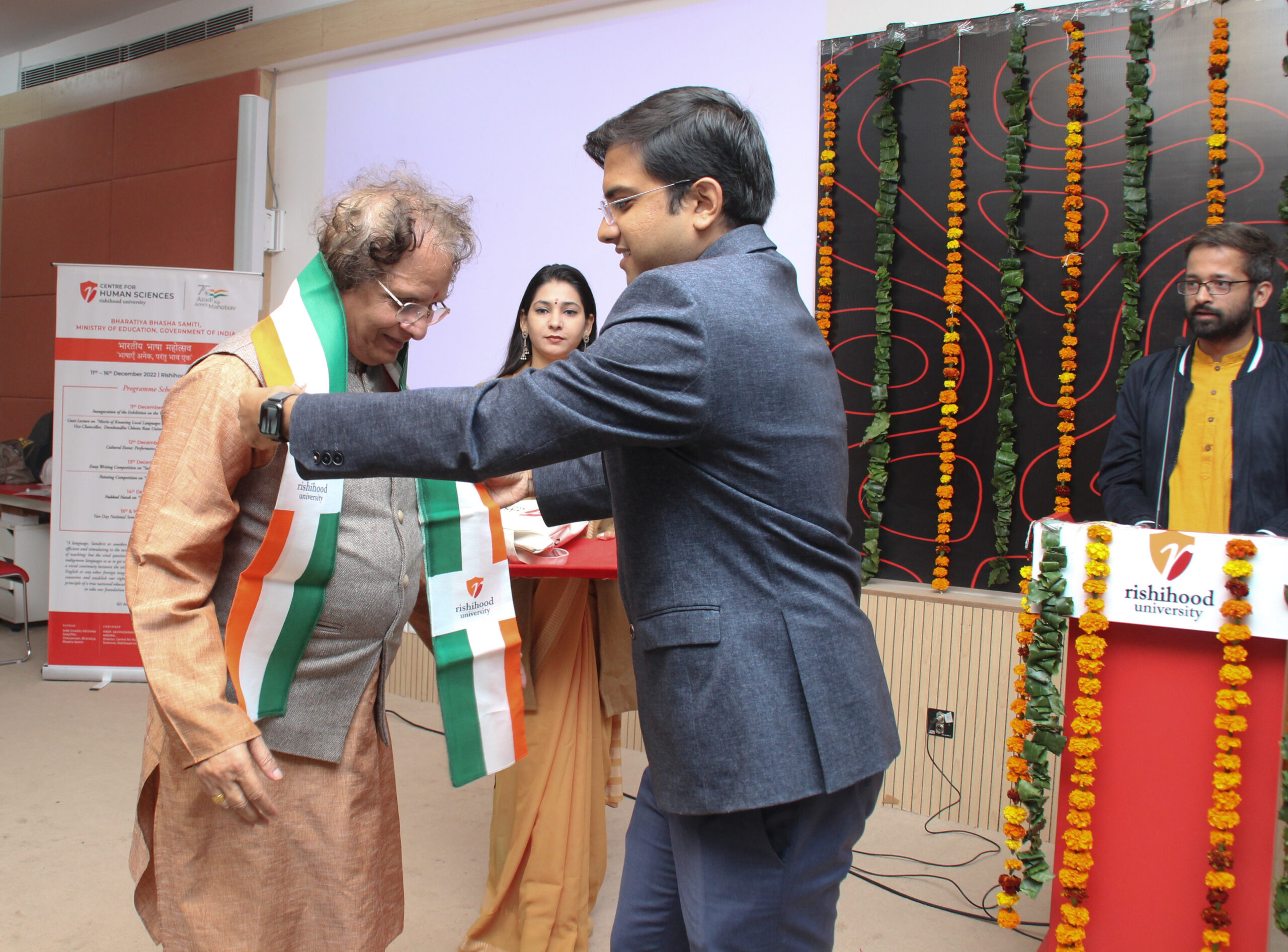
The welcome address was given by Prof. Sampadananda Mishra ji, director of the Centre for Human Sciences and convenor of the six-day event. He beautifully explained how there can be no existence without language and unless there is the lamp of language to enlighten us, the entire world will get submerged into darkness. He also pointed out the challenges that a multilingual country like India faces and thanked Bharatiya Bhasha Samiti for their efforts directed towards addressing these challenges.

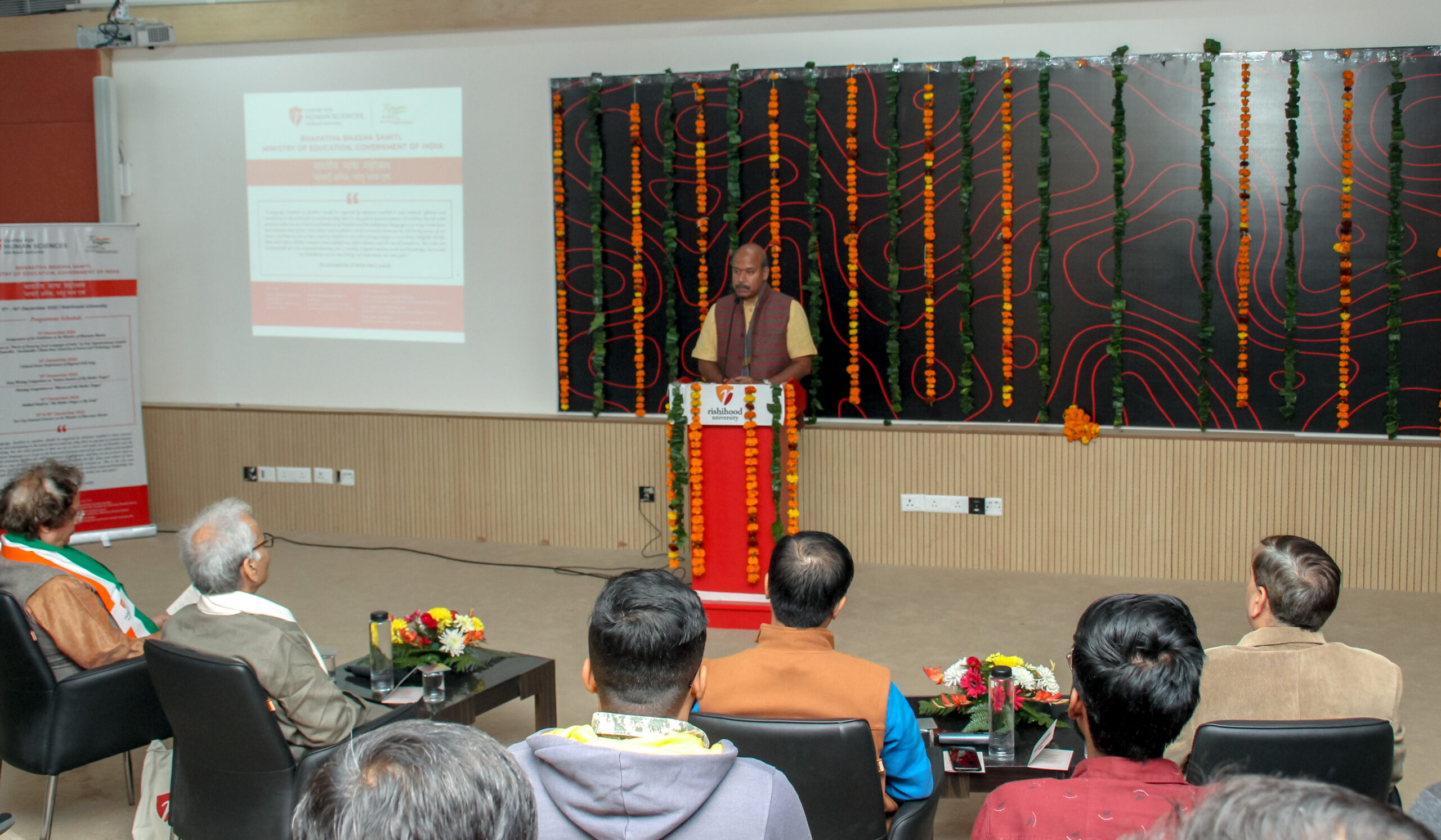
Prof. Shobhit Mathur ji, spoke about the need for imparting higher education in Indian languages by taking examples from his own experience of how several countries in North America, South America, Africa and China are using their local languages for imparting education as well as for innovation. He spoke of the inferiority complex that Indians suffer from because of which we value English more than our own languages and even go on to promote English by rewarding those who speak it well both in educational as well as work spaces. Speaking about how
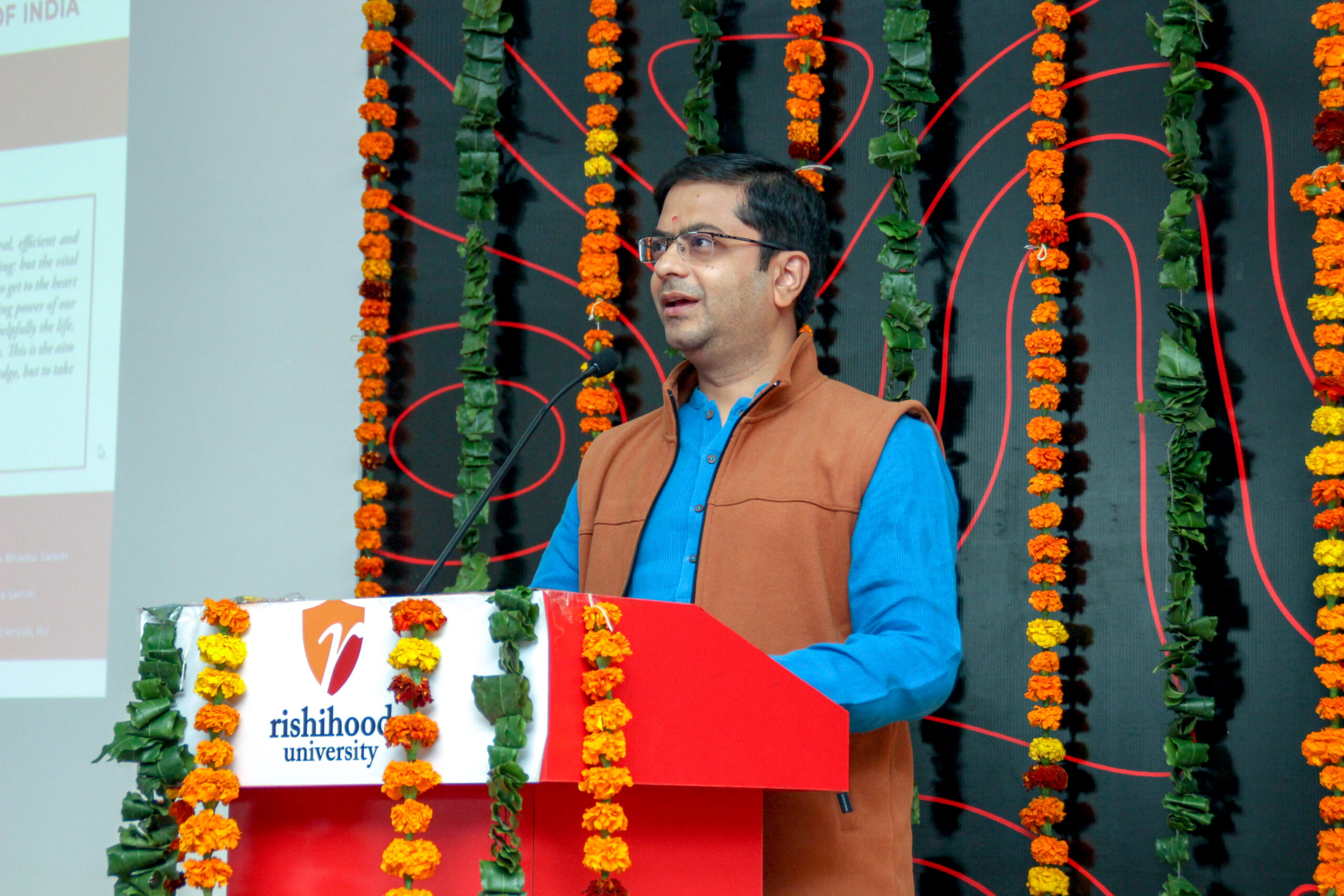
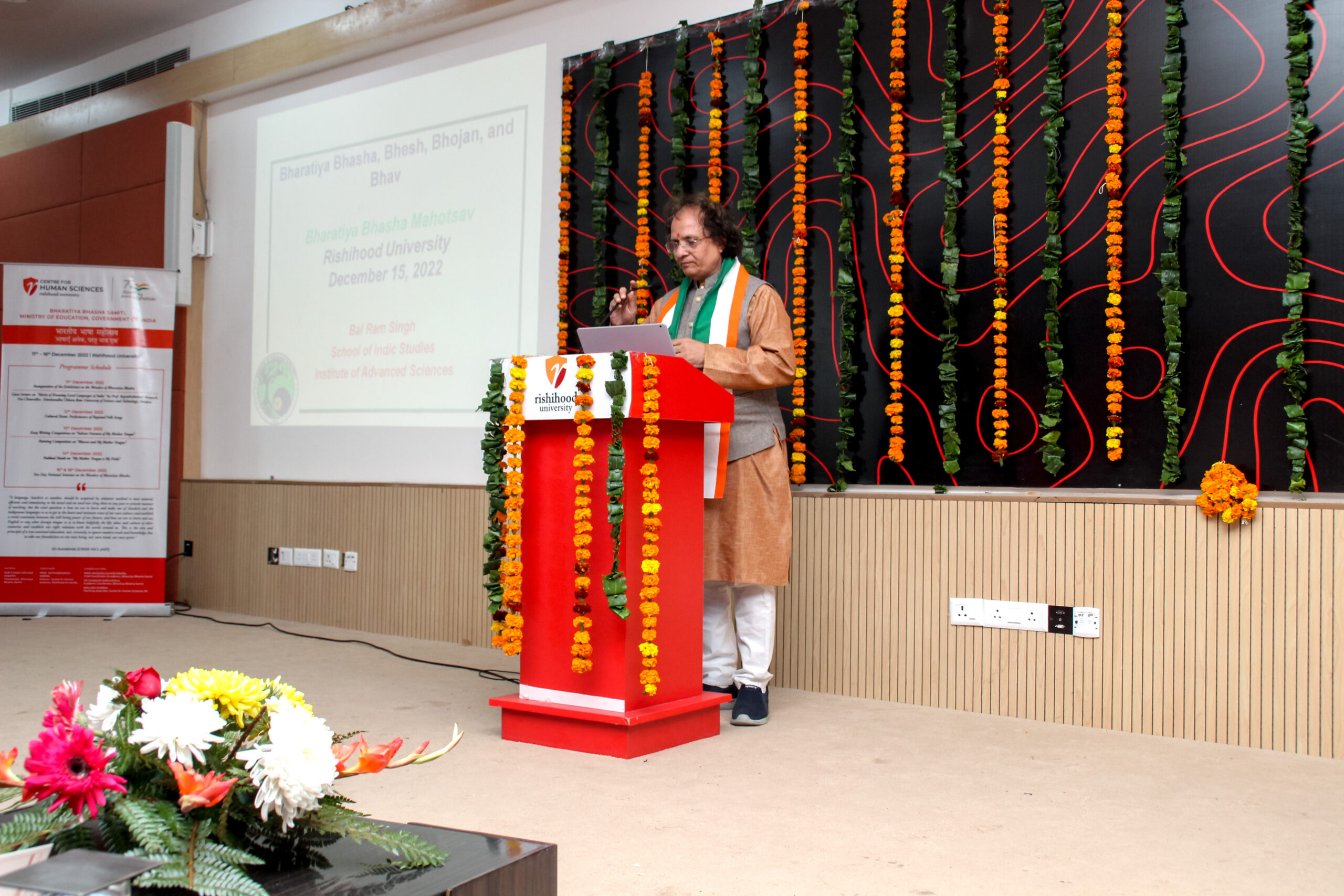
language acts as a vehicle for culture, he explained how Rishihood University is working towards encouraging the use of Indian languages not just at academic front but also at non-academic fronts as well.
In the special address, Prof. Balram Singh ji explained how language relates to culture, dressing, food and ideas. With a small anecdote from his personal life, he explained how we intentionally or unintentionally prefer English because of the fear of valuing one Indian language more than the other. Building upon the importance of language he explained the etymology of the word “vyakti” in India as a vyakti is the one who expresses. He also underlined the importance of translation in strengthening our cultural unity. He deliberated upon how sounds impact our nervous system and our genetic structure and highlighted the scientific nature of Indian languages and their intonations and explained how even after the diversity of languages in India there is an essential coherence in the structures of all the Indian languages. He stressed upon the importance of valuing the scientific and philosophical basis of our own languages and the need for taking this legacy forward.
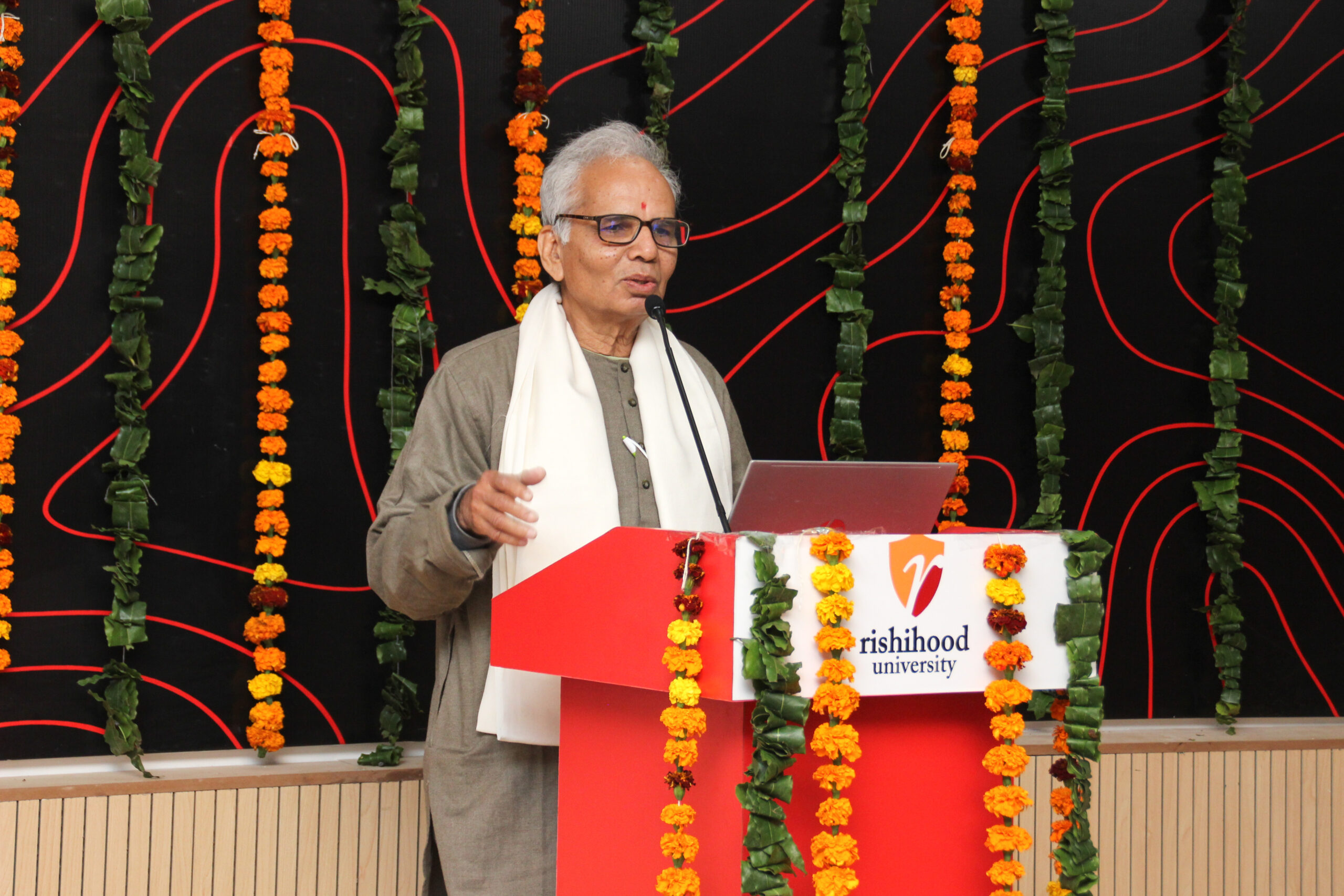
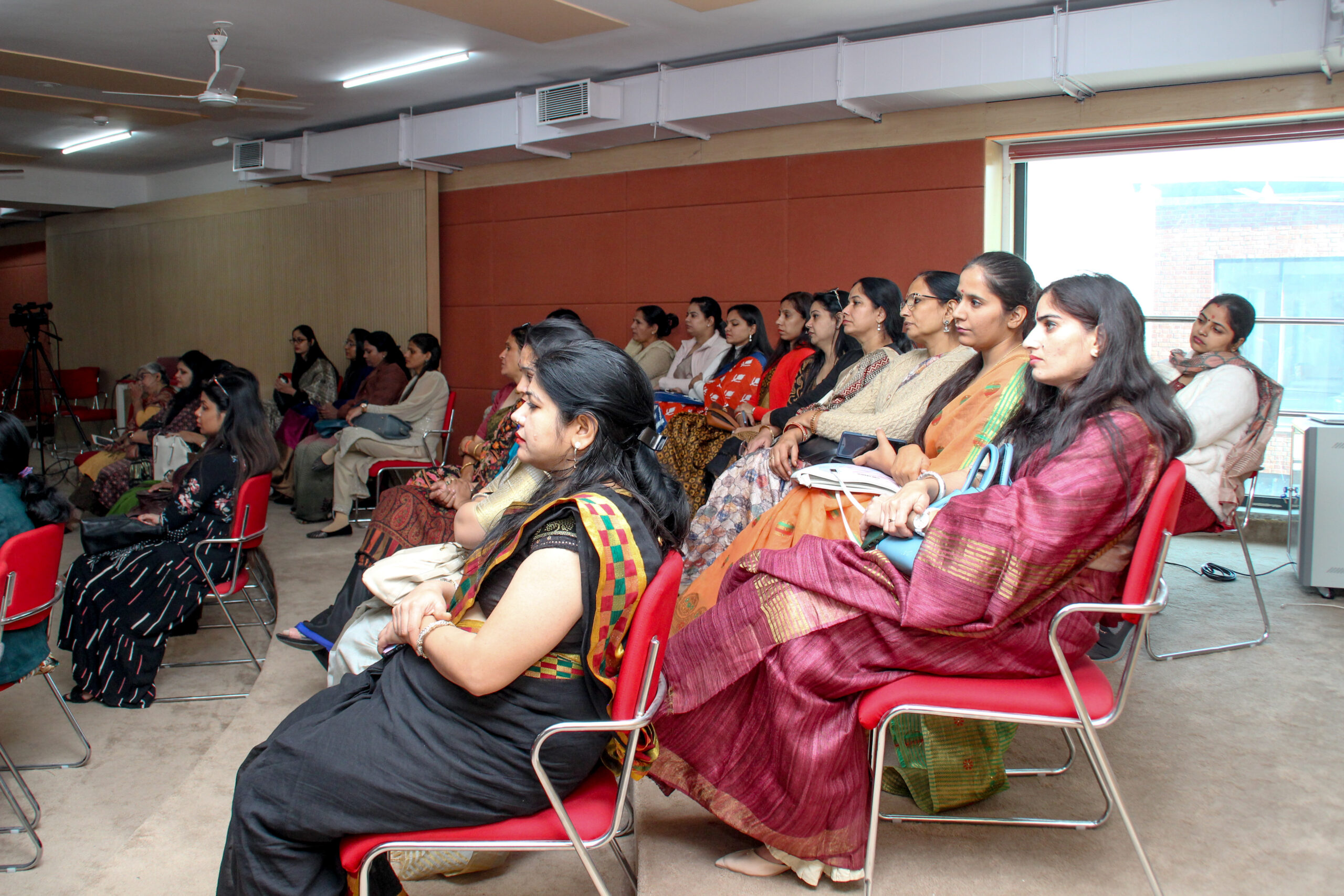
In the chairperson’s address, Prof. Radha Vallabh Tripathi ji, started with congratulating Rishihood University for its endeavour in taking the Indian legacy forward to the younger generations. He explained the importance of multilingualism in the Indian context. Talking about the difference between the concepts of languages and dialects, he explained how this distinction is essentially foreign and no such concept essentially existed in India where we value one more than the other. Explaining the cultural consciousness of India, he pointed out how India adopted even English as one of its official languages even after it being forced upon us, and how our literary giants like Raja Rao have proven that we can also use English in our own way, giving way to the acceptance of Indian English as a standard language. He related it with the use of the word “Hindu” and even if we accept that it was given to us by the foreign invaders with a derogatory connotation, we accepted it and proudly demonstrated to the entire world as to who a Hindu really is. He pointed out that there is no harm in accepting knowledge and development happening in other parts of the world, but the important thing is how we amalgamate it with our own cultural ethos and produce something better for the entire world. He spoke of the development of literature in India and referred to poets like Kabir and Tagore, who wrote in multiple languages. He ended his address by pointing out the challenge of unifying the various languages of India with the same cultural consciousness.
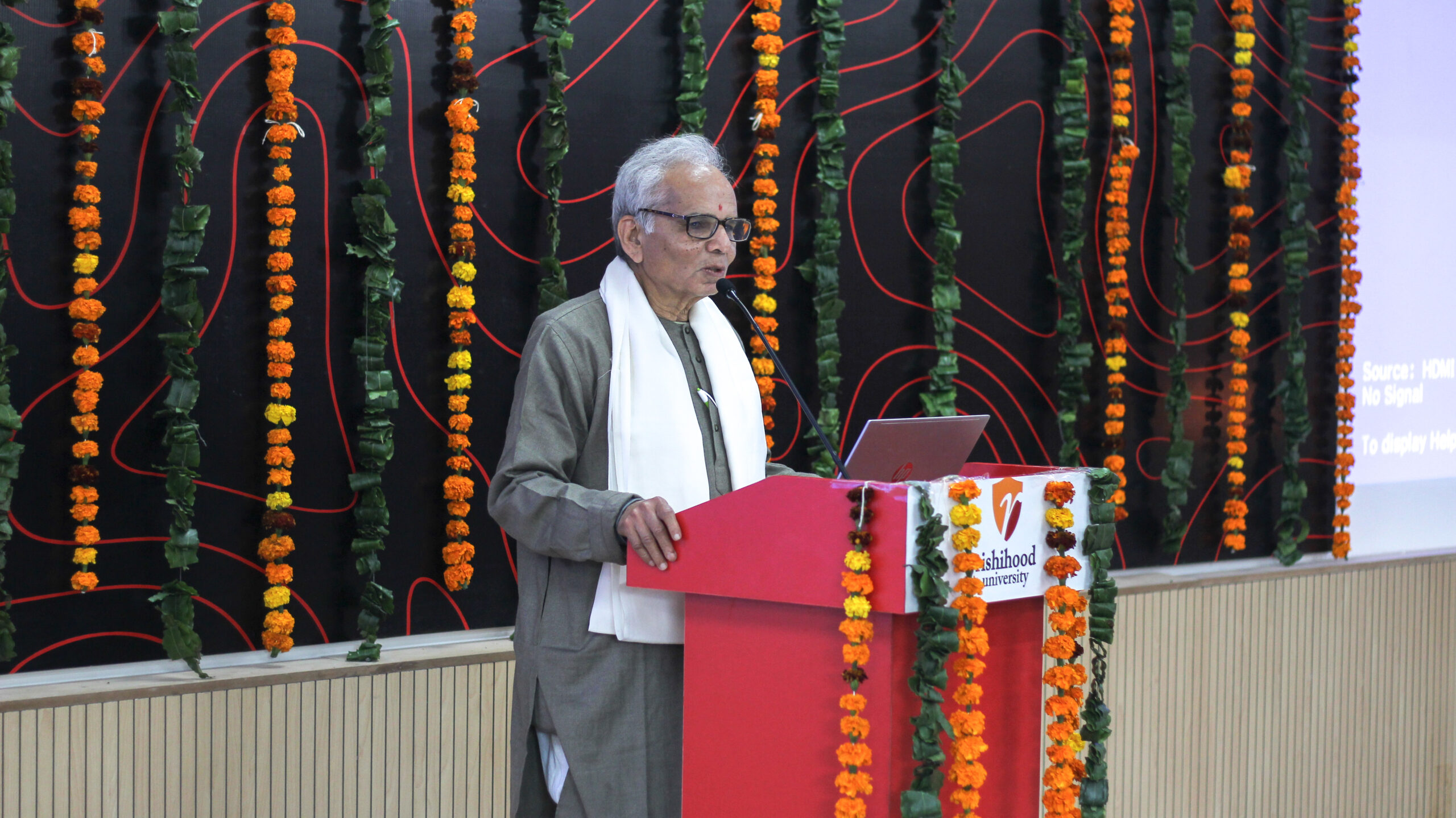
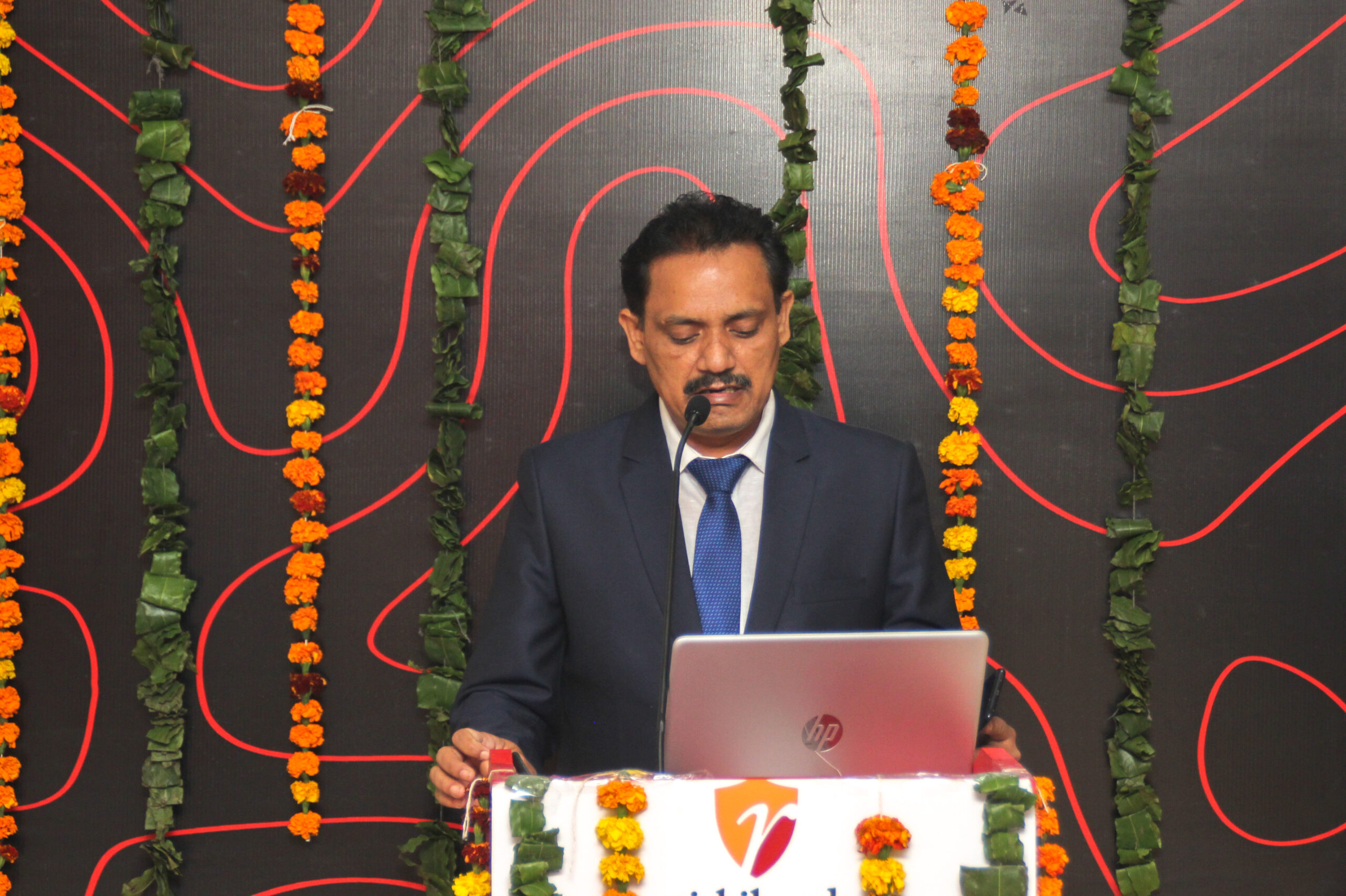
The technical session resumed after the lunch break. Dr Subrat Kumar Prusty ji, Member Secretary of the Institute of Odia Studies and Research, Bhubaneswar, Odisha, spoke on the “Origin and Development of Odia Language and Literature”. He deliberate upon the contributions of the Adivasi languages in the development of Odia. He explained how there are two ways through which language is expressed: the first is through folk forms and secondly through cave paintings. He also explained how the songs sung at various occasions like childbirth, marriage and funeral act as the underlying base for the development of literature. Talking about the development of scripts, he explained the importance of cave paintings and how the Brahmi script acts as the basis for the development of other Indian scripts. Tracing back the historical development of Odia, he explained how it borrows not just from Sanskrit but the Buddhist and Jain literature as well.
Dr M Krishna Rao ji, Assistant Professor of Sanskrit at Sri Venkateswara College, University of Delhi, spoke on the development of Telugu language and literature. He traced the history of Telugu in the last 1200 years. He explained the classification and categorisation of the prominent Dravidian languages and pointed out the different names used for Telugu, like Andhram, Tenugu, Andhra, Telugu, Telugu, Vadugu, etc. and the logic behind the use of such terminologies. He referred to various ancient texts like Ramayana, Mahabharata, Manusmriti in which Andhra and its culture is mentioned. Tracing the history of the development of Telugu literature, Dr Rao remarked that most of the ancient literature in Telugu is available only in oral tradition and also pointed out some major authors and works in Telugu. He concluded by pointing out some interesting facts about Telugu language like it is called the Italian of the East because of its syntactic similarities with Italian. Though Telugu originates from Tamil, 75% of its vocabulary along with grammar is similar to Sanskrit.
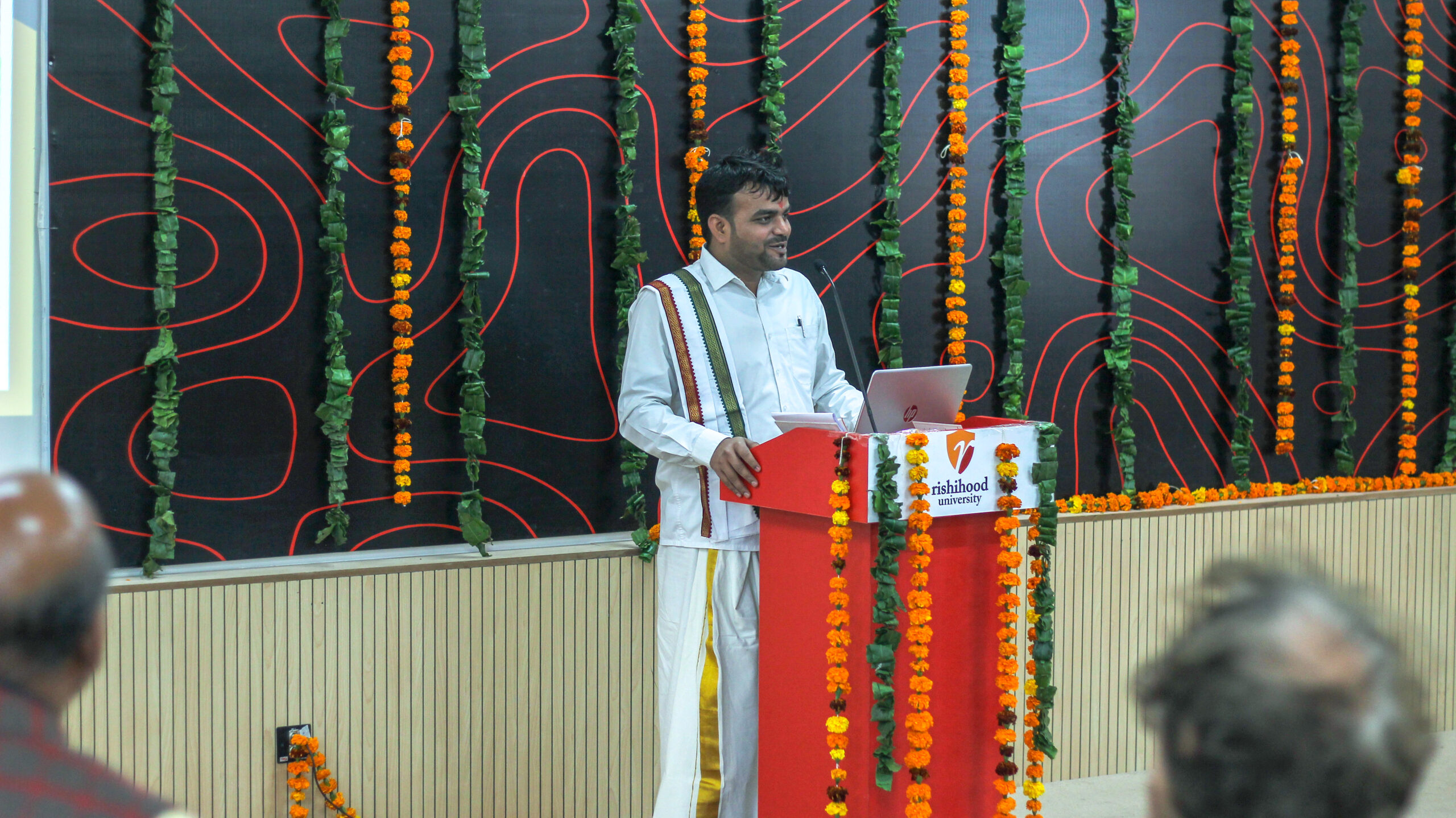
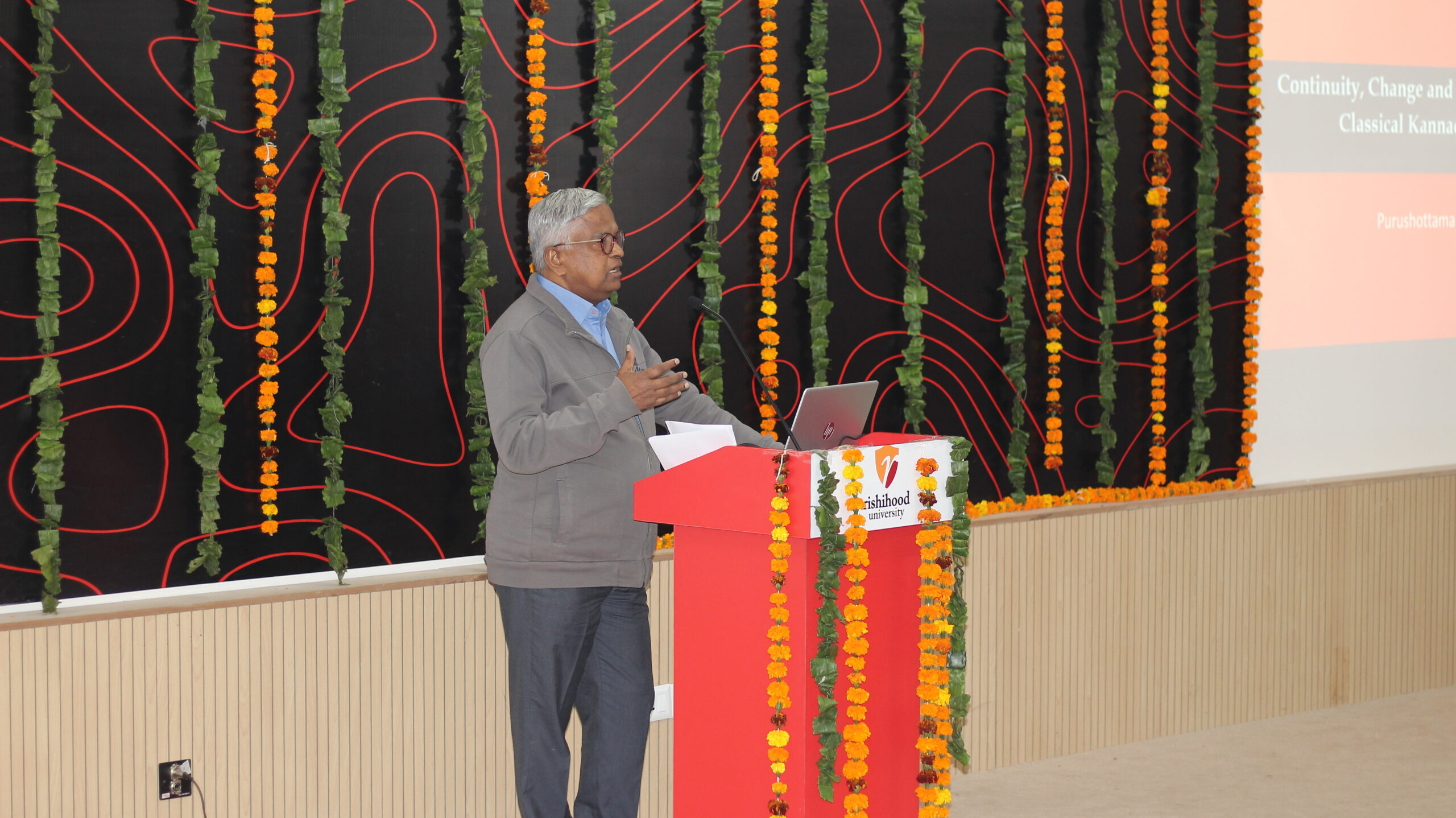
In his talk, Prof. Purushottama Bilimale ji, Professor, Jawaharlal Nehru University, spoke on ‘Continuity, Change and sustainability of Classical Kannada Literature.’ He started by pointing out the diversity of languages in India and explained the need to preserve these languages as most of those are on the verge of extinction. He traced the history of development of Kannada in four stages starting from 450 CE along with the major authors and works produced during the respective epochs. He talked about some important works like Kavirajamarga, Vaddaradhane of Shivakotyacharya, Chavundaraya’s Trishasthi Lakshana Mahapurana, Adipurana of Pampa, Shantipurana of Ponna, Ajitha Tirthankara Purana of Ranna, and authors like Vikramarjuna Vijaya of Pampa, Sahasa Bhima Vijaya of Ranna, Nagavarma 2, Nagachandra, etc. He concluded his talk by speaking about the significant features of Kannada like Campu form, marga (classical) and desi (indigenous), vocabulary, epic conventions, laukika and agamika kavyas, etc.
The first day of the seminar concluded with Dharana, by observing a minute of silence, after which the speakers and participants proceeded for the high tea.
Day 6 (16th December 2022)
Click on the link below to watch the full session:
The final day of the seminar began with Ekagrata, by observing a minute of silence.
The first talk of the day was delivered by Prof. Madhusudan Penna ji, Kavikulaguru Kalidas Sanskrit University, Ramtek, Nagpur, Maharashtra. He spoke about the
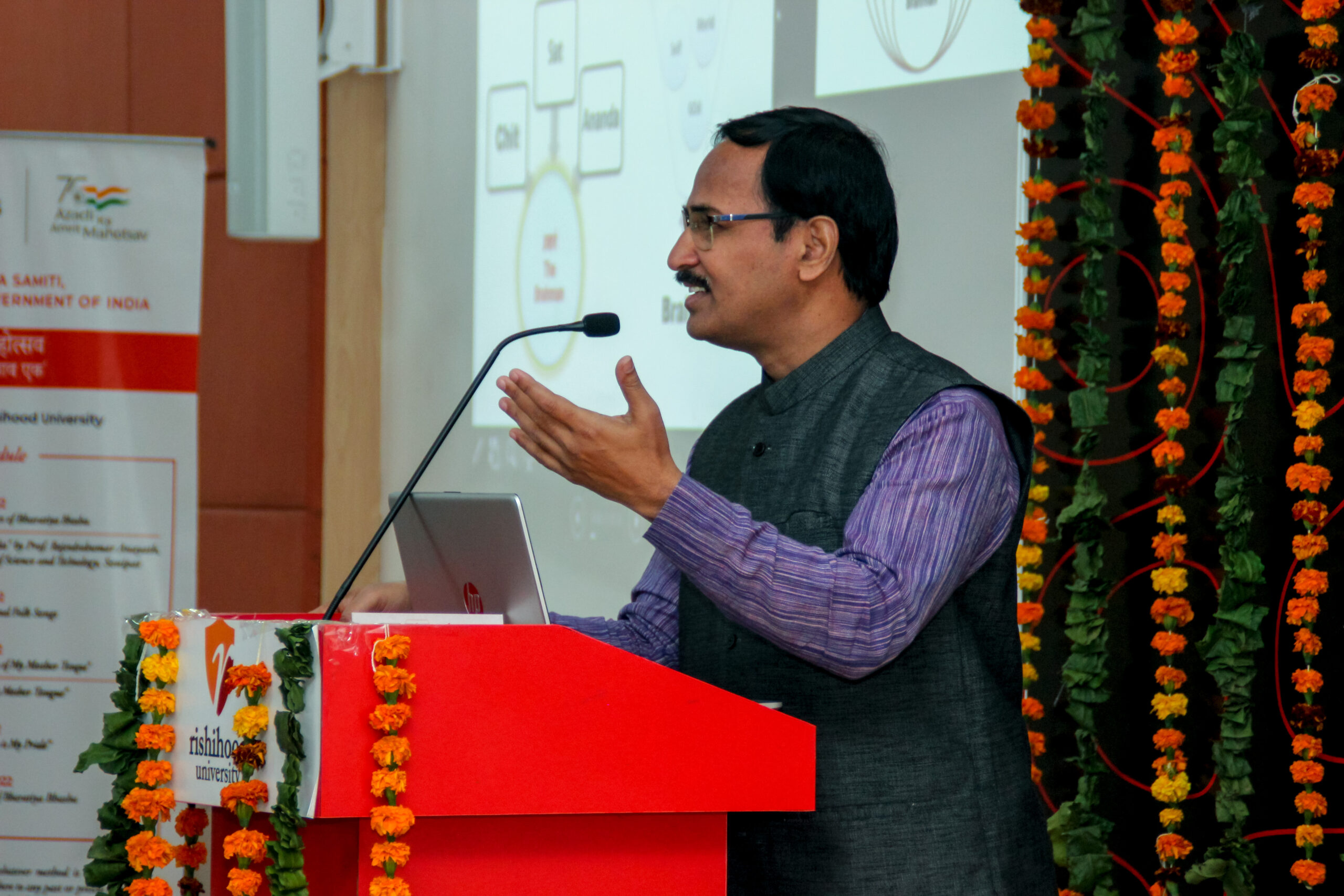

salient aspects of Sanskrit language and literature. He presented Sanskrit as the mother of all languages and that it is the best medium of expression. He talked about Panini and his Ashtadhyayi and the intricacies of Sanskrit grammar. He spoke about the Sanatana philosophy and the notions of Jag, Jiva, atman and Brahma. He also pointed to the vishwavidyalayas and the knowledge traditions in India since ancient times. He explained how many of our developments are attributed to the West and explained how it happened because of the lack of innovative methods of teaching and learning in the middle ages. He also explained the contributions of various rishis towards multiple domains of knowledge ranging from language to mathematics, geography, astronomy, aviation etc. He concluded by talking about some interesting attributes of Sanskrit language and literature and addressed the doubts of participants.
Dr V. Ananthi, Assistant Professor, University of Delhi, spoke about the salient features of Tamil language and literature. She began by pointing out the difference between the Aryan and the Dravidian languages and explained how Tamil is the most prominent amongst all the Dravidian languages. She also deliberate upon the important literary works and authors who contributed to the development of Tamil literature. She quoted Dr Ambedkar who said that Tamil represents the identity of India. She concluded her session by addressing the questions of the participants.
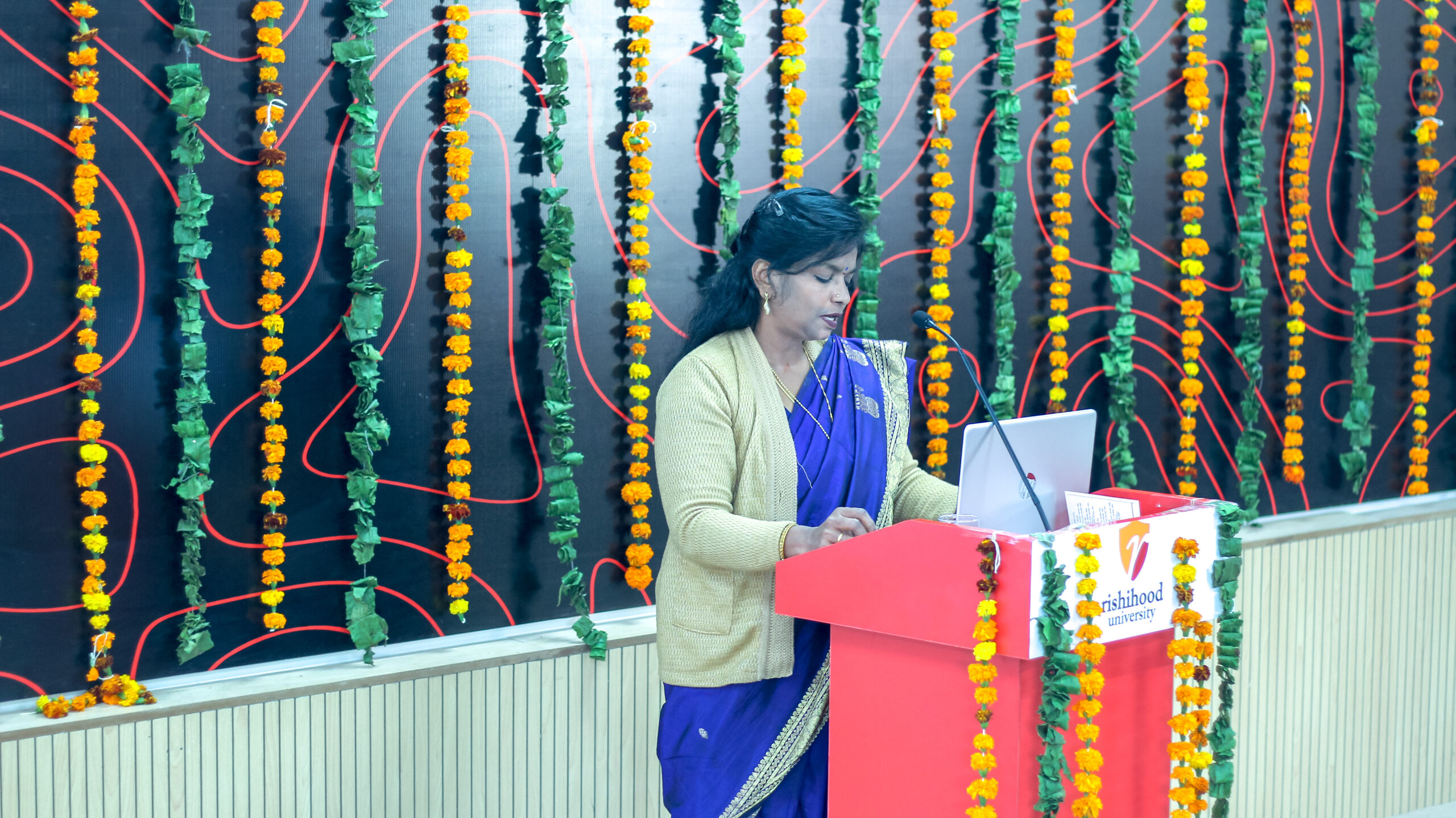
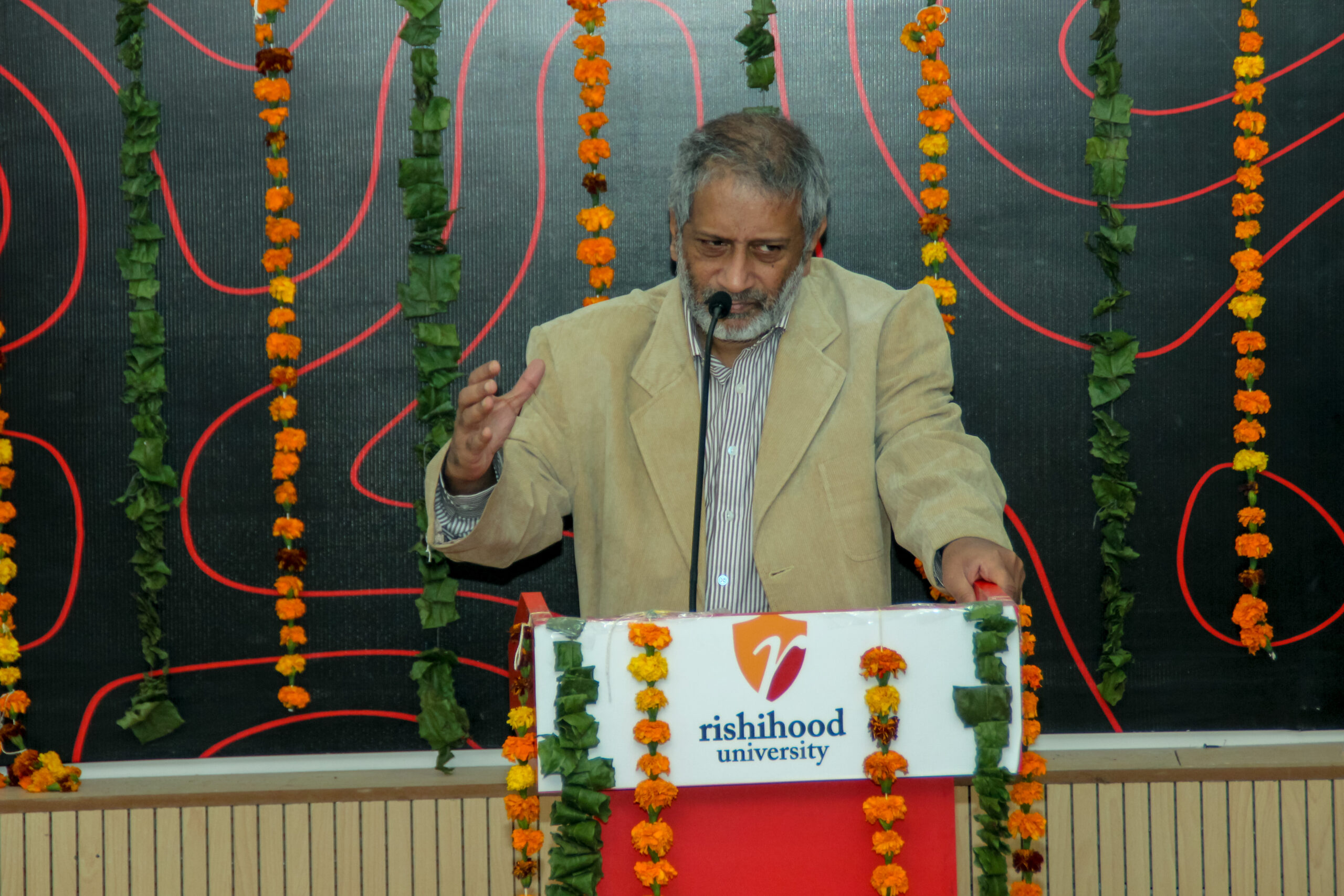
The final talk was delivered after lunch break by Prof. Krishnan Unni P ji, who spoke about the development of Malayalam language and literature. He began his talk by pointing out the conflicts created due to lingual identities. He put stress upon the point that the issue of origin is in itself a very problematic idea as it is a function of socio-economic, political and cultural change. He also deliberated upon the effects of colonisation on the local languages of the colonised people. He explained the influence of Sanskrit on Malayalam by citing many references. He concluded his talk by thanking Bharatiya Bhasha Samiti and Rishihood University for organising the event where the participants got to learn so much about the languages of India.
In the valedictory session, Prof. Madhusudan Penna ji and Prof. Shobhit Mathur ji distributed certificates and prizes to the winners of the singing, dancing, essay writing, painting and drama competitions.
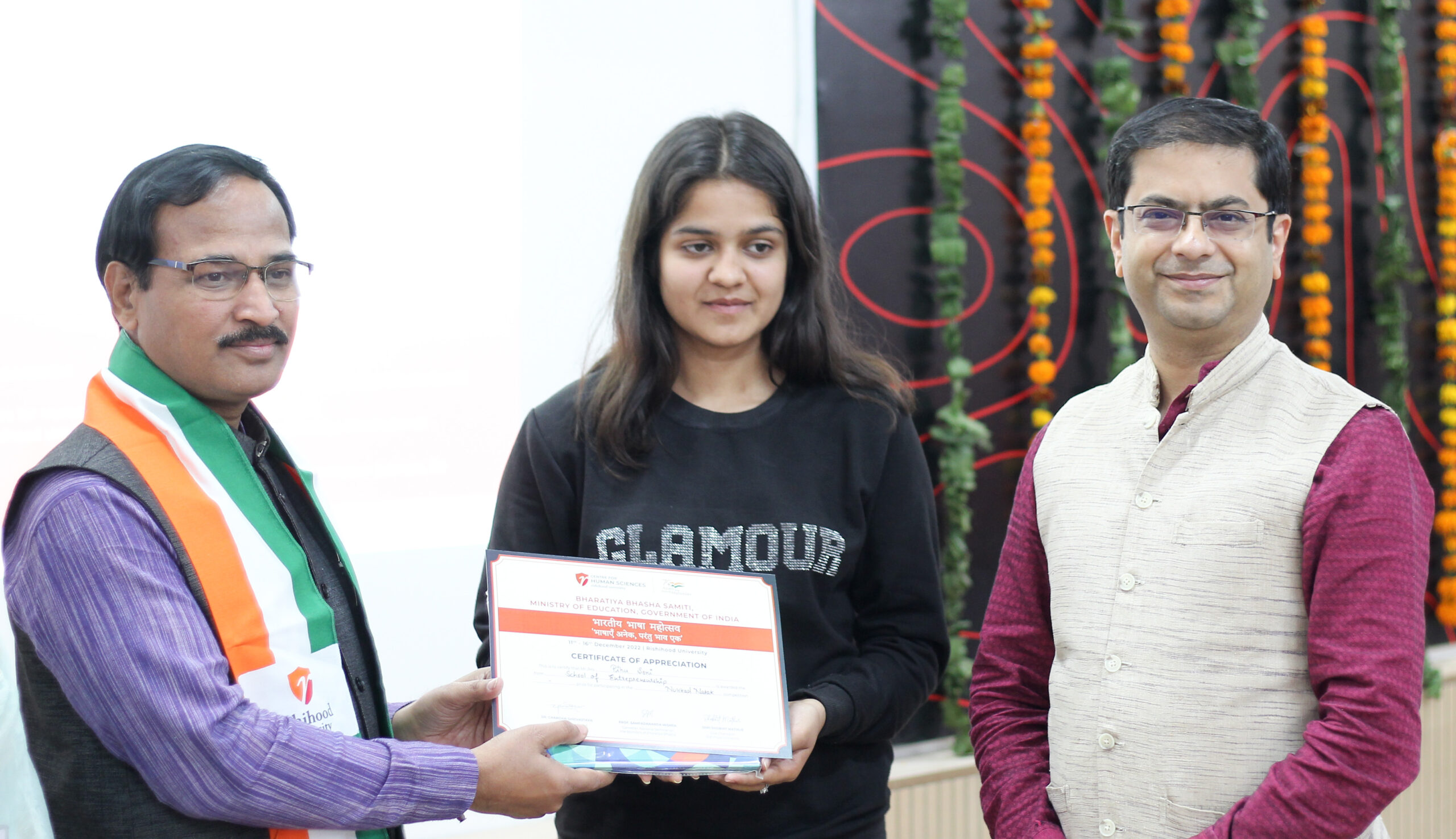
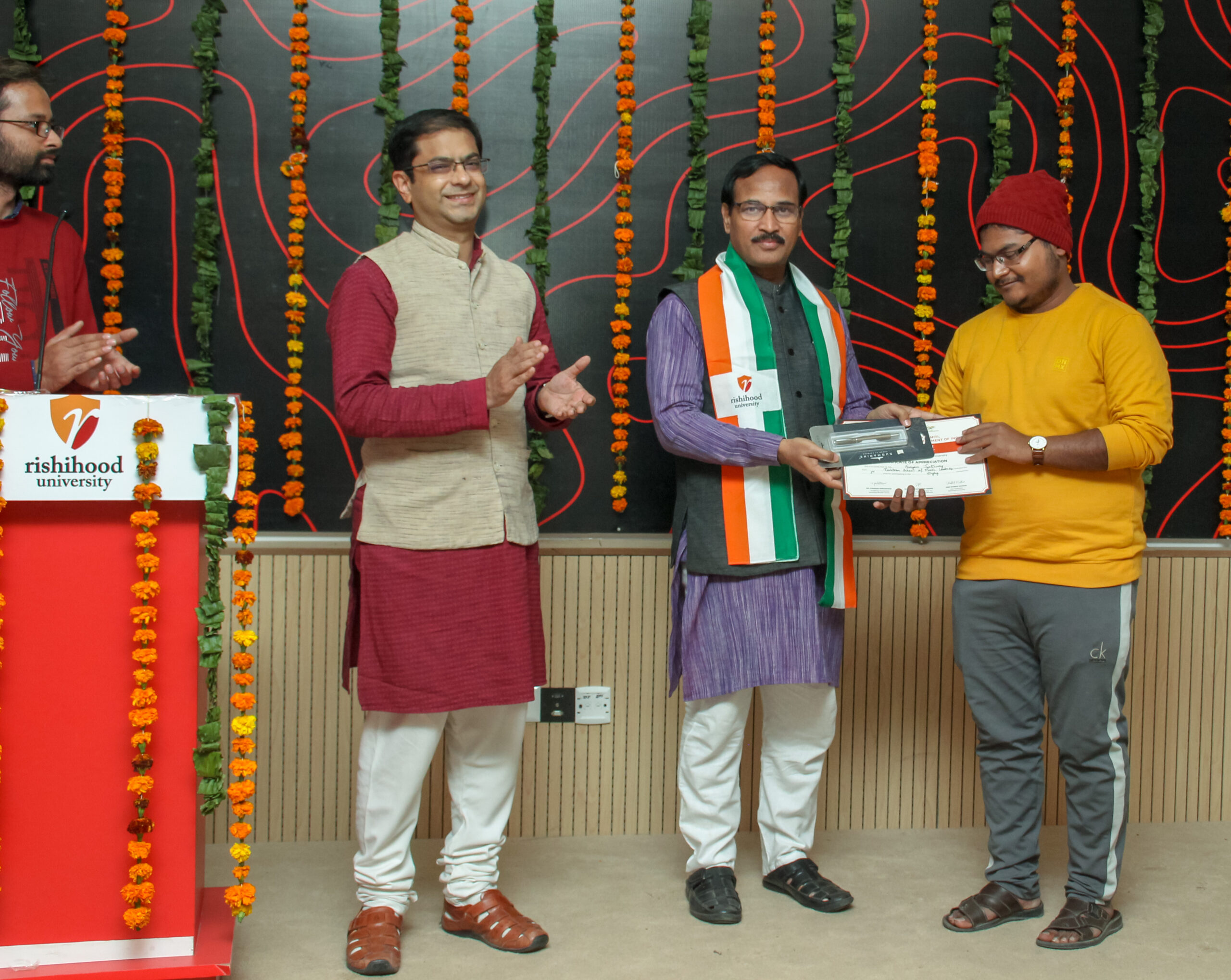
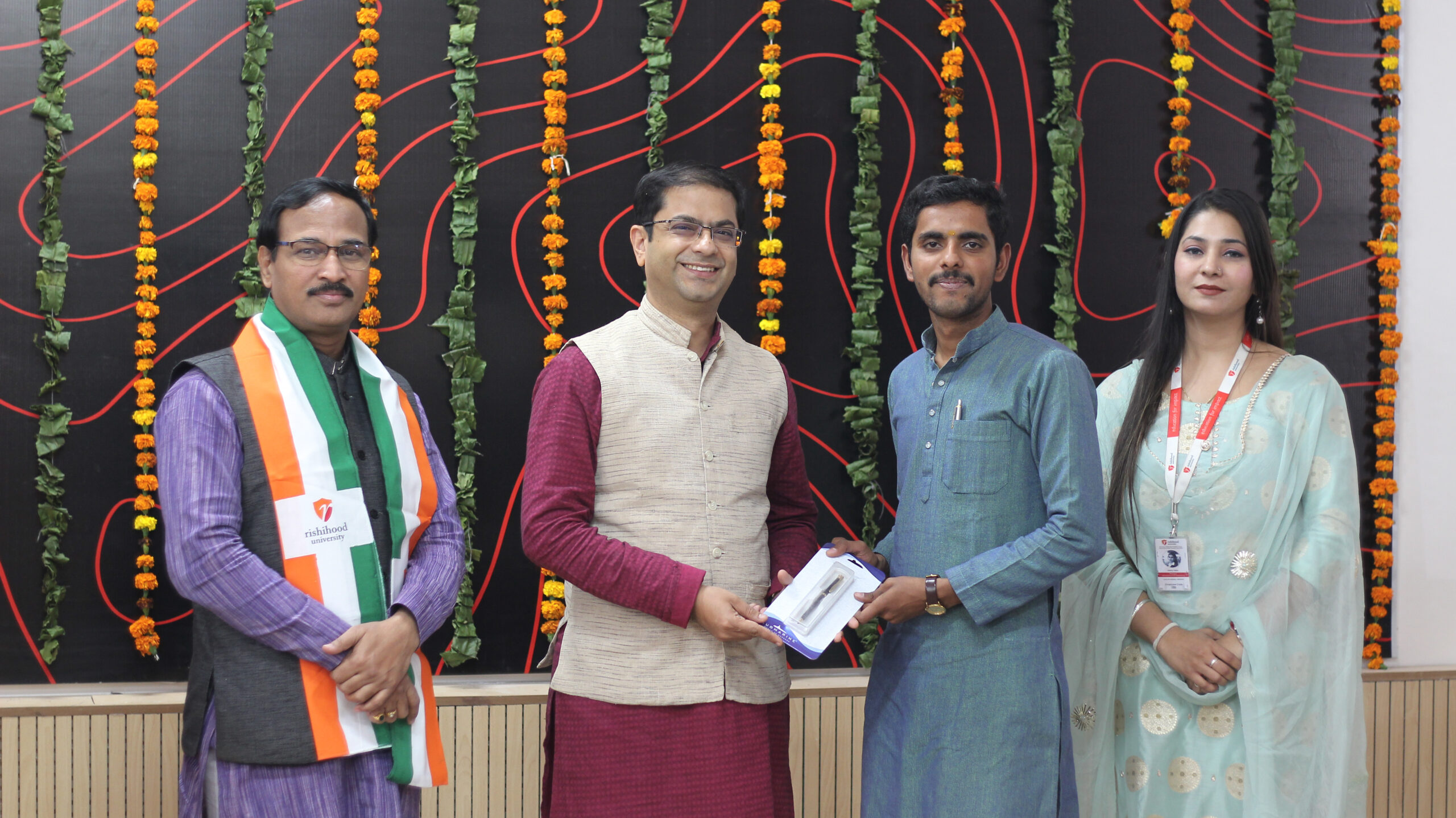
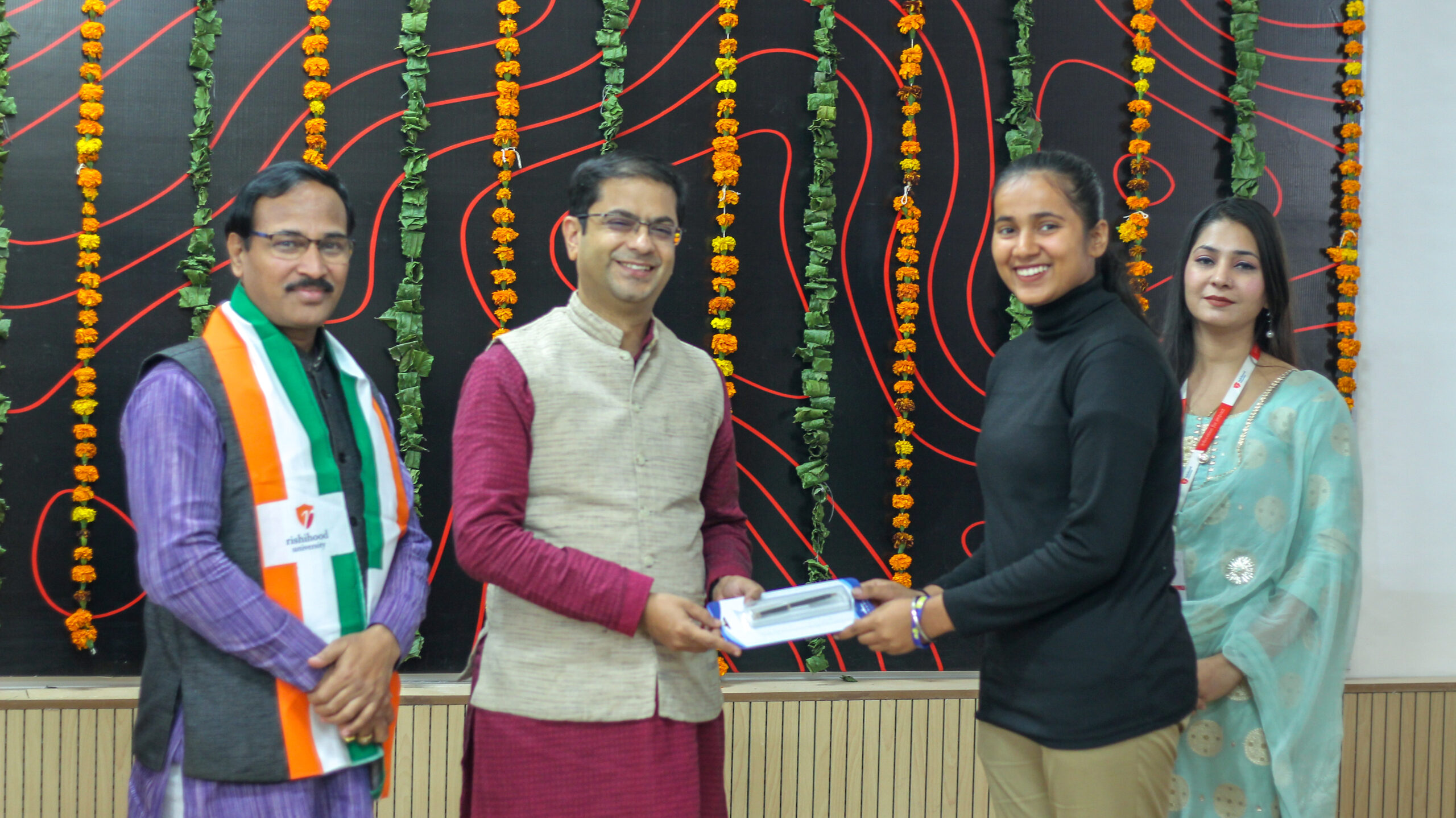
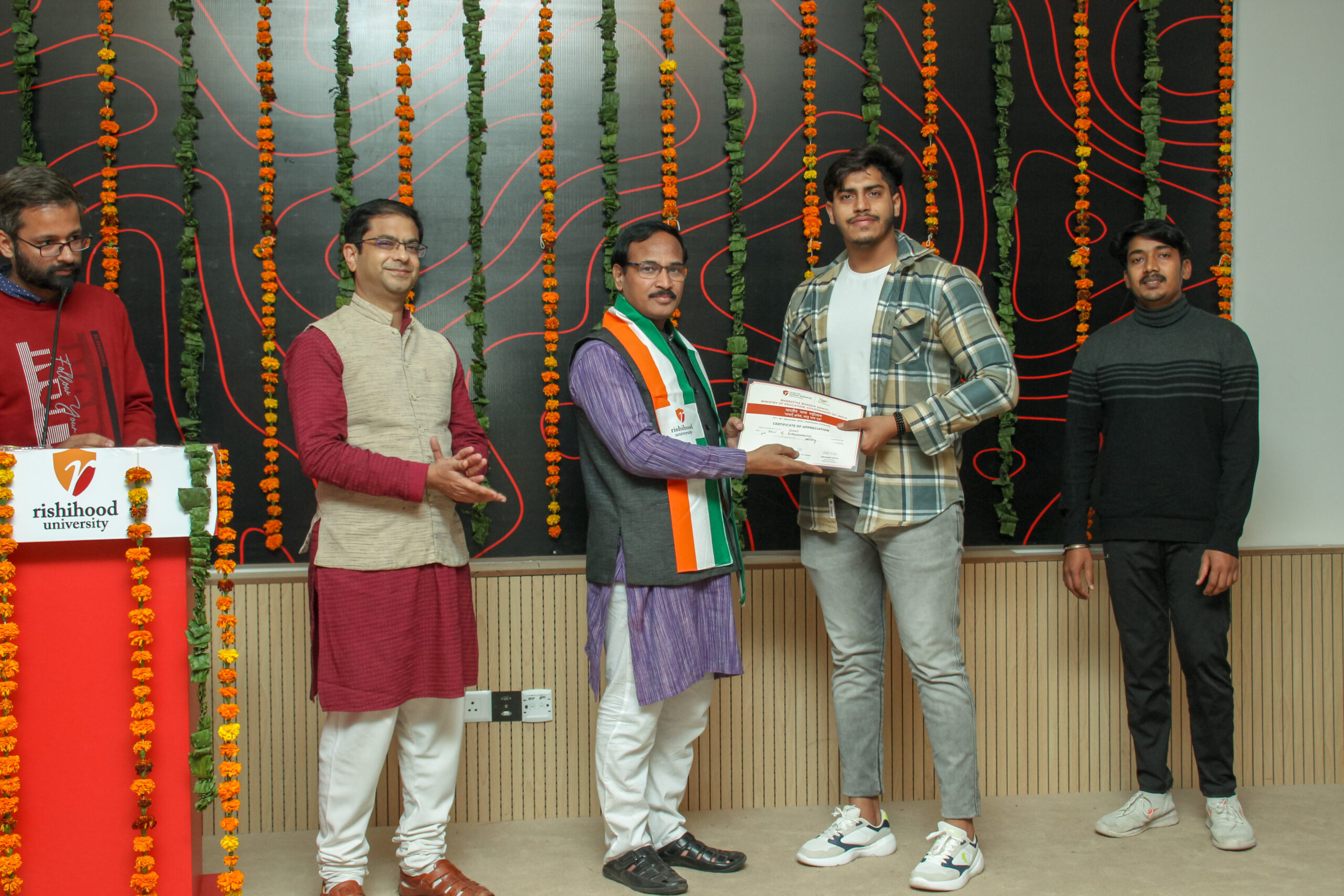
The vote of thanks was delivered by Neelabh Sharma. The event ended with Dharana, by observing a minute of silence, after which the participants proceeded for high tea.
